Fleetwood Mac – Behind The Mask
 It’s official – there’s something Bill Clinton did that I may not be able to forgive him for. He brought Fleetwood Mac back together.
It’s official – there’s something Bill Clinton did that I may not be able to forgive him for. He brought Fleetwood Mac back together.
As I write this, I’m way, way behind on writing music reviews. Fleetwood Mac’s Behind The Mask is an album I bought when it first came out, and it’s taken me this long to get around to weighing in on it, even though at the time I liked it quite a bit – always have. What’s bad about that lag, though, is that Fleetwood Mac has since morphed back into something resembling the lineup from its 70s/80s heyday…and yet something less than it once was. And I’m having to fight down the urge to talk about that and bring that comparison up.
Behind The Mask was a transitional album into a new Fleetwood Mac era. Lindsey Buckingham, who had been the most demanding of the creative pistons firing in the Mac’s engine, had left the group behind after 1987’s Tango In The Night (and a guest stint on a new single for the 1988 Greatest Hits album), but this didn’t doom the group as much as I remember thinking it would. Say what you will about it taking two players to fill Buckingham’s shoes on stage and in the studio, the remaining members had already auditioned replacements for the all-important position of guitarist, and wound up with not one, but two, promising candidates: Billy Burnette and Rick Vito. Not only did both men have an excellent pedigree as steadily-employed, in-demand studio guitarists, they brought their own not-inconsiderable songwriting skills to the table.
And in an amusing demonstration of the question of band identity and how much of that identity lies with the guy in the mixing booth, producer Greg Landanyi made sure that this Fleetwood Mac didn’t sound drastically different from the last Fleetwood Mac that had walked into a recording studio. Buckingham even returned again to lay down acoustic guitar tracks on one song. (Another interesting guest musician credit I noticed on Behind The Mask is Steve Croes; credited here with Synclavier, Croes is a frequent collaborator and session player for Star Trek composer Jay Chattaway.) But in the end, the band’s sound hasn’t shifted a million miles away from where it was. For all of my thinking, in the aftermath of Tango, that Buckingham was going to take the sound with him, in retrospect Behind The Mask sounds more like Fleetwood Mac than, say, Out Of The Cradle does.
“Skies The Limit”, the well-chosen lead single “Save Me”, and the lovely duet ballad “Do You Know” demonstrate what Fleetwood Mac still had then that it doesn’t have now: Christine McVie. Her divine vocals, just-right keyboard and piano work and her songwriting…there was a time when I didn’t really rate her as a major factor in the band’s sound. I’ve since come to realize how badly I can misjudge things sometimes. Christine McVie keeps the ship afloat on this album. And “Do You Know” was a collaboration with Burnette, which shows that the new recruits more than earned their slots in the band. “Save Me” couldn’t have been better chosen as the first song to hit radio, as it has a vibe reminiscent of some of McVie’s best singles in the past; it’s a close conceptual cousin of Tango‘s “Isn’t It Midnight” and “Little Lies”.
I’m still not that partial to Stevie Nicks’ songs here. Considering how much I grew to like her input on Say You Will (and that’s a big turnaround for me), I went back to this album determined to listen with an open mind…somehow her songs just don’t do it for me here. “When The Sun Goes Down”, a Vito/Burnette collaboration, demonstrates why these guys got the job – they’ve got the bluesy-electric-rock thing down, and this song doesn’t sound too far off from some of Lindsey Buckingham’s early numbers soon after joining the band. This isn’t to say that Vito and Burnette appropriated their predecessor’s style, but that they’re steeped in the same background. The two together were a really were a canny choice to fill his shoes.
Overall, I find myself looking back on Behind The Mask with fondness. Okay, even some of Nicks’ stuff, I admit it – I just have to be in a rare Stevie Nicks mood for it to hit me right. This could have been – though I’ll leave it to you out there to decide for yourselves whether or not it should have been – the Fleetwood Mac that stayed together into the new millennium. Where the tortured-perfectionist-artist / ex-lover dynamic may have produced some dynamite songs at one time, and I’m not denying that it did (though I grimaced to watch them hash it out again and again in a recent special about the making of Say You  Will), I’m not sure bringing back the Buckingham/Nicks chemisty was right for the band. In time, this lineup could’ve been incredible. Behind The Mask shows that it was already very promising.
Will), I’m not sure bringing back the Buckingham/Nicks chemisty was right for the band. In time, this lineup could’ve been incredible. Behind The Mask shows that it was already very promising.
Thank you for once again reading my review of Say You Will.
- Skies The Limit (3:45)
- Love Is Dangerous (3:18)
- In The Back Of My Mind (7:03)
- Do You Know (4:19)
- Save Me (4:16)
- Affairs Of The Heart (4:22)
- When The Sun Goes Down (3:18)
- Behind The Mask (4:18)
- Stand On The Rock (4:00)
- Hard Feelings (4:54)
- Freedom (4:13)
- When It Comes To Love (4:09)
- The Second Time (2:31)
Released by: Warner Bros.
Release date: 1990
Total running time: 54:26
Tori Amos – Tales Of A Librarian
 Really more of a contractual obligation than anything, Tales Of A Librarian brings Tori Amos’ contract with Atlantic Records to an end and provides the fans with her first official best-of compilation. As with so many greatest hits collections, the main critique is going to be in the selection of material, though in most cases Librarian gives you what you’d expect; there’s a heavy emphasis on Little Earthquakes, represented by “Tear In Your Hand”, “Me And A Gun”, “Winter”, “Crucify”, “Precious Things” and “Silent All These Years”. Under The Pink is represented by “God”, “Cornflake Girl” and “Baker Baker”, while “Professional Widow” (wildly reworked; see below), “Way Down” and “Mr. Zebra” are here from Boys For Pele (what, no “Caught A Lite Sneeze”?).
Really more of a contractual obligation than anything, Tales Of A Librarian brings Tori Amos’ contract with Atlantic Records to an end and provides the fans with her first official best-of compilation. As with so many greatest hits collections, the main critique is going to be in the selection of material, though in most cases Librarian gives you what you’d expect; there’s a heavy emphasis on Little Earthquakes, represented by “Tear In Your Hand”, “Me And A Gun”, “Winter”, “Crucify”, “Precious Things” and “Silent All These Years”. Under The Pink is represented by “God”, “Cornflake Girl” and “Baker Baker”, while “Professional Widow” (wildly reworked; see below), “Way Down” and “Mr. Zebra” are here from Boys For Pele (what, no “Caught A Lite Sneeze”?).
There’s a surprising omission in the selection of songs from from the choirgirl hotel as well, as “Raspberry Swirl” is nowhere to be found; that album’s selection instead consists of “Spark”, “Jackie’s Strength”, and a version of “Playboy Mommy” that I’d swear has been, if not re-recorded, then at least heavily remixed. (All of the songs have been subtly reworked at least a little bit, but this is the most extreme example of that.) Perhaps not surprisingly, Strange Little Girls doesn’t make a showing at all, while only “Bliss” is drawn from the double album To Venus And Back.
The early era of Tori’s career – in some ways her most creatively energized years – is also represented by the Little Earthquakes-era B-sides “Mary” and “Sweet Dreams”, though they aren’t the original recordings.
“Mary” and “Sweet Dreams” were both re-recorded from the ground up for this album, and both of them receive a somewhat more raw, stripped-down treatment than their original versions. “Sweet Dreams” was always a bit of a jaunty, rollicking little number, with Tori backed up by the Subdudes, only here it’s arranged a little more loosely (though still with a full band backing), perhaps a little more representative of how it would sound today played live. It’s also shifted down a couple of keys, losing some of the original’s soaring backing vocals in the chorus. “Mary” has undergone an even more striking change, though – it’s gone from the traditional Little Earthquakes-style piano solo to a laid-back full-band arrangement similar to “Sweet Dreams”. And while I prefer the originals of both songs, these new arrangements aren’t bad. Just different. I’ve actually grown to like this alternative reading of “Mary” quite a bit.
Completely new on Librarian are “Angels” and “Snow Cherries From France”, which of course follow the same style as the rearranged B-sides: laid-back, with a small band, something that wouldn’t have been out of place on Scarlet’s Walk.
The whole re-recorded B-side thing bugs me a bit, because there’s something that would easily fulfill the contractual obligation and please the fans: Tori’s B-sides are a goldmine of fantastic material (in fact, while I rarely review CD singles here, I made an exception for some of Tori’s early CD singles because they were actually better than some of the album tracks). Not only are they good material, but they’ve become fairly scarce on CD. Surely a best-of-B-sides collection is waiting to happen somewhere.
Similarly, the bonus DVD of live material, while nice, misses the boat too – for years, Tori’s fans have been waiting for a video compilation on DVD. At least half of the tracks on Librarian have music videos that are just begging for an official release, and they’re some of the best examples of that medium in the past 15 years. Atlantic has announced and then cancelled a Tori Amos music video DVD at least twice to date;  perhaps Librarian could’ve been a simultaneous multimedia release with these same hits receiving a long-overdue DVD treatment.
perhaps Librarian could’ve been a simultaneous multimedia release with these same hits receiving a long-overdue DVD treatment.
As it is, though, Librarian is a nice chronicle of Tori Amos’ career, with some interesting tracks that span the gap between where she’s been and where she’s going next.
- Precious Things (4:32)
- Angels (4:29)
- Silent All These Years (4:12)
- Cornflake Girl (5:08)
- Mary (4:44)
- God (3:56)
- Winter (5:45)
- Spark (4:15)
- Way Down (1:52)
- Professional Widow (3:50)
- Mr. Zebra (1:07)
- Crucify (5:02)
- Me And A Gun (3:45)
- Bliss (3:37)
- Playboy Mommy (4:08)
- Baker Baker (3:14)
- Tear In Your Hand (4:40)
- Sweet Dreams (3:41)
- Jackie’s Strength (4:27)
- Snow Cherries From France (2:56)
Released by: Atlantic
Release date: 2003
Total running time: 79:20
dada – How to Be Found
 After dada’s terrific self-titled fourth album, the band was dropped by their label MCA; they went on hiatus soon after. Michael Gurley and Phil Leavitt formed Butterfly Jones, while Joie Calio started working on a solo project. The hiatus wasn’t quite permanent, however, and in 2003 the guys got the band back together for an extensive tour. In the new year, they’ve finally managed to pry a group of previously-unreleased songs away from MCA and released How To Be Found. Far from a collection of rejects and outtakes, the album is an addition to the discography on par with the band’s previous efforts.
After dada’s terrific self-titled fourth album, the band was dropped by their label MCA; they went on hiatus soon after. Michael Gurley and Phil Leavitt formed Butterfly Jones, while Joie Calio started working on a solo project. The hiatus wasn’t quite permanent, however, and in 2003 the guys got the band back together for an extensive tour. In the new year, they’ve finally managed to pry a group of previously-unreleased songs away from MCA and released How To Be Found. Far from a collection of rejects and outtakes, the album is an addition to the discography on par with the band’s previous efforts.
Most of these songs sound like they’re in the same mold as the tracks from dada, but on How To Be Found the production and mix are a little more spare, a little more raw – very reflective of the band’s live sound. The album is fairly evenly divided between high-tempo rockers, such as “Crumble” and “Nothing Like You”, and more meandering almost-psychedelic tunes, including “I Wish You Were Here Now” and “Love Is a Weird Thing”. Leavitt’s drums feature heavily on a number of songs, totally carrying the high-energy “It’s All Mine “along and blending beautifully with Gurley’s guitar and Calio’s bass on “Any Day the Wind Blows”. “What’s Happening to Steven” blends those elements with some great organ work to give the song a bit of a classic-rock feel that’s not out of place on the album. As always, the lead vocals are handled by Calio and Gurley, and while I love the music these two have done on heir side and solo projects, put them together and their voices support and play off each other to great effect.
I usually prefer dada’s rockers to the slower stuff, and this album is no exception. I can enjoy tracks like “Guitar Girl” and “I Wish You Were Here Now”, but they don’t give me the almost transcendent glee that I  feel listening to “It’s All Mine” or “Any Day”. Two exceptions would be the album opener, “The Next Train Out of My Mind”, which does a great job of “warming up” the listener for the rest of the album, and the wistful “Reason”, which has some great vocals from Calio. This is a solid and very welcome return for one of my favorite bands.
feel listening to “It’s All Mine” or “Any Day”. Two exceptions would be the album opener, “The Next Train Out of My Mind”, which does a great job of “warming up” the listener for the rest of the album, and the wistful “Reason”, which has some great vocals from Calio. This is a solid and very welcome return for one of my favorite bands.
- The Next Train Out of My Mind (5:40)
- It’s All Mine (4:27)
- How to Be Found (3:27)
- Crumble (3:07)
- Nothing Like You (2:57)
- Guitar Girl (4:45)
- Any Day the Wind Blows (4:46)
- Blue Girl (4:08)
- My Life Could Be Different (3:35)
- What’s Happening to Steven (4:03)
- I Wish You Were Here Now (6:06)
- Reason (3:51)
- Love Is a Weird Thing (4:32)
Released by: Blue Cave
Release date: 2004
Total running time: 55:31
Seth Sternberger – Unfortunate Brain Chemistry
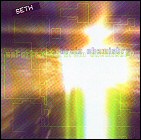 Seth Sternberger, the indie remix guru behind the sublime 8-Bit Weapon, also does the modern thing – and does it well – in Unfortunate Brain Chemistry. Seth’s jams run the gamut from traditional techno to the 2001 entry in the “Fifth Element Diva Dance competition” (something I award to the first person in a given year who sticks a beat on top of an operatic female vocal). The operatic track in question, “Venus”, is a beauty, and its placement early on in the tracklist nicely subverts whatever expectation you might have of what you’re listening to. Other favorites on here include the childlike-but-mechanical “Robot Kindergarten”, some retro kitsch courtesy of “Trite Little Disco Bunnies”, and the drum-heavy “Agonizing Truth About Love”.
Seth Sternberger, the indie remix guru behind the sublime 8-Bit Weapon, also does the modern thing – and does it well – in Unfortunate Brain Chemistry. Seth’s jams run the gamut from traditional techno to the 2001 entry in the “Fifth Element Diva Dance competition” (something I award to the first person in a given year who sticks a beat on top of an operatic female vocal). The operatic track in question, “Venus”, is a beauty, and its placement early on in the tracklist nicely subverts whatever expectation you might have of what you’re listening to. Other favorites on here include the childlike-but-mechanical “Robot Kindergarten”, some retro kitsch courtesy of “Trite Little Disco Bunnies”, and the drum-heavy “Agonizing Truth About Love”.
There are some so-so tracks as well, namely the bits-of-recorded-conversation-over-breakbeats tracks “Chicks Dig Me” and the eyebrow-raising “My X Is A Whore”. (Erm…okay, Seth. Thanks for sharing!) “Chicks Dig Me” sounds like a lo-fi recording of someone’s phone sex conversation under a funky rhythm track. If you’re into that sort of thing. (Probably says more about me than it does the CD, but I’ve  actually gotten to like that one with repeated exposure.)
actually gotten to like that one with repeated exposure.)
Unfortunate Brain Chemistry is a bit of a mixed bag, but it shows Seth Sternberger’s ability outside of the blip-tone genre, and certainly makes for an interesting contrast.
- Coal (4:28)
- Venus (2:45)
- Femachine (5:00)
- Chicks Dig Me (2:47)
- Frequency Push (4:12)
- Robot Kindergarten (2:28)
- My X Is A Whore (3:12)
- Waiting Remix (3:17)
- Trite Little Disco Bunnies (3:17)
- Agonizing Truth About Love (4:59)
- Don’t Play This Backwards (2:40)
Released by: Brainscream
Release date: 2001
Total running time: 39:05
Moody Blues – A Question Of Balance
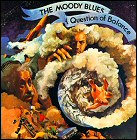 For the re-invention album that it’s supposed to be, the Moody Blues’ A Question Of Balance really seems to be less about re-inventing the seminal ’60s band’s sound and more about changing how the band achieved that sound. With some of their more eloquent numbers approaching the point where they couldn’t be duplicated outside of the studio, the Moodies tried to return to a more guitar-based sound that they could achieve on stage (keep in mind, this was over three decades ago, before they could get anyone’s symphony orchestra to back them up in front of Red Rocks or any other rocks). And yet there’s still a whiff of the epic here, largely thanks to early sampling/loop-based keyboards and synths like the Mellotron. Hence, not a huge change in the sound, but it was becoming easier to pull it off live.
For the re-invention album that it’s supposed to be, the Moody Blues’ A Question Of Balance really seems to be less about re-inventing the seminal ’60s band’s sound and more about changing how the band achieved that sound. With some of their more eloquent numbers approaching the point where they couldn’t be duplicated outside of the studio, the Moodies tried to return to a more guitar-based sound that they could achieve on stage (keep in mind, this was over three decades ago, before they could get anyone’s symphony orchestra to back them up in front of Red Rocks or any other rocks). And yet there’s still a whiff of the epic here, largely thanks to early sampling/loop-based keyboards and synths like the Mellotron. Hence, not a huge change in the sound, but it was becoming easier to pull it off live.
And you couldn’t get much more of an epic opening to an album than “Question”‘s bam-BAAAAM! opening if you tried. That song in particular is one I’ve always loved from a lyrical standpoint, with the underlying question of “why are these things happening?” tackling the “hate and death and war” that outlasted the 60s peace movement. Hayward’s lyrics don’t bother asking where we went wrong, but instead asks why the question can’t be answered. “Question” = rock music + metaphysics. (Ed. note: theLogBook’s Assistant Editor Dave Thomer has since informed me that this is more a question of epistemology than metaphysics. And y’know, I bet he’s right.) Either way, it’s hard to beat.
And as much as I like that track, there’s a bonus – nine whole other songs! The metaphysical bent continues with “How Is It (We Are Here)?”, a nice follow-on from “Question”, and then things get a little more personal with “The Tide Rushes In” (a song, according to the liner notes interview, written by John Lodge in the wake of a fight with his wife at the time). I’m torn on “Tide” – I’ve never felt that it was up to much lyrically, and yet the vocal performance in and of itself is worth the price of admission.
“Don’t You Feel Small?” brings back the philosophical feel, with an unusual combination of the Moodies’ trademark harmonies and the exact same lyrics being whispered loudly. The harmonies return for the catchy “Tortoise And The Hare”, a classic bit of Moodies rock. Things get a bit southern-fried with the bluesy opening guitar riff of “It’s Up To You”, another song worthy of inclusion on any best-of anyone might care to put together. “Minstrel’s Song” belongs on there too, by the way, with its enchanting, last-gasp-of-the-60s “everywhere, love is all around” chorus.
“Dawning Is The Day” doesn’t stand out quite as much as the spate of excellent songs before it, but lulls the listener into a false sense of security before Mike Pinder’s haunting “Melancholy Man” kicks in quietly. This  leads us into some Graeme Edge poetry in “The Balance” – y’know, it’s almost a clichè by now, but it’d almost be a crime to have a Moody Blues album that didn’t close on some of Graeme’s spoken-word poetry.
leads us into some Graeme Edge poetry in “The Balance” – y’know, it’s almost a clichè by now, but it’d almost be a crime to have a Moody Blues album that didn’t close on some of Graeme’s spoken-word poetry.
A Question Of Balance is one of the Moodies’ strongest early offerings, with not a single dud in the bunch. If the worst thing I can say about “Dawning Is The Day” is that it’s a fine song that just simply doesn’t stand out among a batch of positively stellar songs, that’s not bad. Highly recommended.
- Question (5:43)
- How Is It (We Are Here)? (2:44)
- And The Tide Rushes In (2:57)
- Don’t You Feel Small (2:37)
- Tortoise And The Hare (3:22)
- It’s Up To You (3:11)
- Minstrel’s Song (4:27)
- Dawning Is The Day (4:21)
- Melancholy Man (5:45)
- The Balance (3:28)
Released by: Threshold
Release date: 1970
Total running time: 38:35
Genesis – Abacab
 I’ve been meaning to review this album for two or three years now, and it’s such an odd beast to get a grip on. This is Genesis in flux, and yet Genesis finding its feet. Several years after losing Peter Gabriel to a solo career, the remaining trio of founding members soldiered on, and yet sometimes you’d think they were clinging to the past. Abacab is an album full of good songs, but it’s also an album with something of a serious identity crisis.
I’ve been meaning to review this album for two or three years now, and it’s such an odd beast to get a grip on. This is Genesis in flux, and yet Genesis finding its feet. Several years after losing Peter Gabriel to a solo career, the remaining trio of founding members soldiered on, and yet sometimes you’d think they were clinging to the past. Abacab is an album full of good songs, but it’s also an album with something of a serious identity crisis.
The title track – edited down to little over half of its original running time – received healthy radio airplay at the time of the album’s release, but along with songs like “Me And Sarah Jane”, “Keep It Dark” and “Who Dunnit?”, “Abacab” represents the majority of this album’s personality. Phil Collins, Tony Banks and Mike Rutherford seemed to be trying to hang onto the prog-rock sound of the Gabriel era, with meandering song structures (“Sarah Jane” in particular can’t seem to latch onto any one particular melody, trying out several melodic lines and discarding them in turn – it’s almost like early Split Enz). This isn’t necessarily a bad thing – I quite like “Abacab” and “Keep It Dark”, and they demonstrate that, when he used to try to emulate Gabriel’s throat-thrasing vocal style, there used to be a raw power to Phil Collins’ voice which his latter-day career has carefully buried.
It’s in songs like “Man On The Corner” and especially “No Reply At All” that one finds hints of the future Genesis sound. The latter in particular is bouncy, with some Motown-style brass work and a lighthearted lyric. “Man On The Corner” is again somewhat brooding and dark, with just a hint again of the Peter Gabriel influence, but it’s indicative of my favorite era of Genesis – songs better suited to Collins’ vocal range and style, but falling somewhere between the Gabriel-era Genesis sound and Collins’ later self-styled reinvention of himself as a soft-pop balladeer. It may not be the original sound mandated in the Gabriel/Hackett era, but it was the best possible style for the Collins-led Genesis.
 Abacab, in retrospect, is a bit of a mixed bag – but, being a bit of a transitional piece (despite having been preceded by two other albums with the Banks/Collins/Rutherford lineup), it was bound to be. They were really starting to get it here.
Abacab, in retrospect, is a bit of a mixed bag – but, being a bit of a transitional piece (despite having been preceded by two other albums with the Banks/Collins/Rutherford lineup), it was bound to be. They were really starting to get it here.
- Abacab (7:02)
- No Reply At All (4:41)
- Me And Sarah Jane (6:00)
- Keep It Dark (4:34)
- Dodo / Lurker (7:30)
- Who Dunnit? (3:22)
- Man On The Corner (4:27)
- Like It Or Not (4:58)
- Another Record (4:30)
Released by: Atlantic
Release date: 1981
Total running time: 47:04
Pseudo Echo – Long Plays ’83-’87
 Ah, the heady days of junior high. That’s when I first encountered Australian pop group Pseudo Echo, as they carved an unlikely swath through the U.S. charts with their Euro-synth-ified remake of Lipps Inc.’s “Funkytown”. These days I file Pseudo Echo – and Love An Adventure, the album which spunoff the aforementioned single – under the heading of “guilty pleasures that, if I’m to be honest, I still like quite a lot.” And I do.
Ah, the heady days of junior high. That’s when I first encountered Australian pop group Pseudo Echo, as they carved an unlikely swath through the U.S. charts with their Euro-synth-ified remake of Lipps Inc.’s “Funkytown”. These days I file Pseudo Echo – and Love An Adventure, the album which spunoff the aforementioned single – under the heading of “guilty pleasures that, if I’m to be honest, I still like quite a lot.” And I do.
Which brings us to this album of remixes. The late 80s were a haven for extended mixes, some of them beautiful examples of the art of editing, others more like the result of sticking fifteen chimpanzees in a room with two tape decks and a big friendly pause button. One of my favorite such mixes, however, was the extended version of “Funkytown”, with its phasing drum solos and a kind of logical pacing that didn’t completely destroy the progression of the song. I had the 12″ inch single of that mix, back when buying vinyl was still an option in most cases, but wound up giving it away to someone later, so it’s good to have it back.
The real prize for me here, however, is the extended remix of “Destination Unknown”, another tune from Love An Adventure, that just about blew my mind. The original had such a cool backing track that I’d always wished I could hear it without vocals – I thought it’d make someone, somewhere, a dandy TV theme song. That teenage wish has finally been fulfilled by a mix that runs through one full verse and one full chorus with no vocals at all, and so help me, it’s still a cool song.
 The rest of the tracks here – reworking tracks from both Love An Adventure and its follow-up Race – run the gamut from unremarkable dance floor fodder to remixes which actually reveal some depth to the original songs, which I’ve always felt was the best thing a remix can really hope to do. As few and far between as Pseudo Echo fans may be outside of Australia, I can at least recommend this to them. It’s a decent new take on some old favorites.
The rest of the tracks here – reworking tracks from both Love An Adventure and its follow-up Race – run the gamut from unremarkable dance floor fodder to remixes which actually reveal some depth to the original songs, which I’ve always felt was the best thing a remix can really hope to do. As few and far between as Pseudo Echo fans may be outside of Australia, I can at least recommend this to them. It’s a decent new take on some old favorites.
- Listening (5:35)
- A Beat For You (7:26)
- Stranger In Me (6:04)
- Don’t Go (6:40)
- Love An Adventure (6:21)
- Living In A Dream (5:39)
- Destination Unknown (5:48)
- Funky Town (6:35)
Released by: EMI Australia
Release date: 1990
Total running time: 49:54
Ben Folds – Ben Folds Live
 Culled from the tour supporting of his excellent 2001 album Rockin’ The Suburbs, Ben Folds Live gives us a chance to hear Folds unplugged – just one man and his piano…as if that’s somehow a limitation. Folds makes the best of some of the more “produced” numbers by getting the audience to provide some backup (most notably on “Army”, which demonstrates that there were a lot of damn good singers in his audience that night, as does “Not The Same”). In other cases – “Fred Jones Part 2”, “The Luckiest” and “Jane” among them – he doesn’t need any elaborate backing; the songs are strong enough to stand on their own merits.
Culled from the tour supporting of his excellent 2001 album Rockin’ The Suburbs, Ben Folds Live gives us a chance to hear Folds unplugged – just one man and his piano…as if that’s somehow a limitation. Folds makes the best of some of the more “produced” numbers by getting the audience to provide some backup (most notably on “Army”, which demonstrates that there were a lot of damn good singers in his audience that night, as does “Not The Same”). In other cases – “Fred Jones Part 2”, “The Luckiest” and “Jane” among them – he doesn’t need any elaborate backing; the songs are strong enough to stand on their own merits.
Some lesser-known live chestnuts of the Ben Folds Five era also pop up, including the excellent “Silver Street”, and even a cover of Elton John’s “Tiny Dancer” makes the list. Folds himself is quiet and unassuming, occasionally introducing the songs with a preamble explaining their origins, but he doesn’t go on and on about it. At one point, he interrupts the intro to “Brick “to assure everyone present that the abortion-themed number has no political agenda, but merely relays the raw emotions of the event, and then promptly  apologizes for stopping her performance for that explanation. Without even trying to be funny, he still is – and I think all this adds up to something called showmanship without being overly showy.
apologizes for stopping her performance for that explanation. Without even trying to be funny, he still is – and I think all this adds up to something called showmanship without being overly showy.
Definitely one of the better live albums I’ve heard, and certainly good enough to convince me to jump at the chance to see Folds live should he pass this way anytime soon.
- One Angry Dwarf And 200 Solemn Faces (4:17)
- Zak And Sara (3:24)
- Silver Street (3:41)
- Best Imitation Of Myself (3:13)
- Not The Same (4:31)
- Jane (2:34)
- One Down (4:03)
- Fred Jones Part 2 (4:40)
- Brick (4:45)
- Narcolepsy (6:04)
- Army (3:41)
- The Last Polka (3:55)
- Tiny Dancer (5:23)
- Rock This Bitch (1:17)
- Philosophy (7:17)
- The Luckiest (4:39)
- Emaline (3:50)
Released by: Epic
Release date: 2002
Total running time: 71:14
Journey – Frontiers
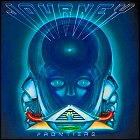 Quite possibly the first rock album to have a video game based on it (the arcade game Journey actually predates an Atari 2600 cartridge called Journey Escape by several months), Journey’s Frontiers is one of those pivotal, everybody-remembers-it, all-things-to-all-people albums of the 80s. On the good side, it’s got some of the group’s most memorable songs. On the downside, it takes us away from songs like “Lights” and starts Journey on its slippery downhill slope toward being yet another glam hair band.
Quite possibly the first rock album to have a video game based on it (the arcade game Journey actually predates an Atari 2600 cartridge called Journey Escape by several months), Journey’s Frontiers is one of those pivotal, everybody-remembers-it, all-things-to-all-people albums of the 80s. On the good side, it’s got some of the group’s most memorable songs. On the downside, it takes us away from songs like “Lights” and starts Journey on its slippery downhill slope toward being yet another glam hair band.
“Send Her My Love” comes real close to being – for those of you familiar with Plato’s concept of the “perfect form” – the perfect form of the ’80s power ballad. Not the first one to come along by any means, but all the prerequisite elements are there. It’s a decent song, good lyrics, and all the while it’s riding on a chunky bed of distorted guitar that seems to constantly want to break into the searing solo that finally comes 2/3 of the way into the song – the quintessential Slow Song With Power Chords. Before Bon Jovi was riding a steel horse regardless of being dead or alive, I might add. “Faithfully” runs a close second and adds another traditional power ballad touch, the wordless vocal restatement of the main melody in place of an actual verse.
And of course, everyone’s heard – or, more likely, seen the then-omnipresent video to – “Separate Ways (Worlds Apart)”. That opening keyboard riff is about as ’80s as you can get. Play just that part of that song to someone over the age of 20, and chances are it’ll take ’em back to some kind of a memory of where and who they were at the time. This, too, is a decent song, but for my money, not as good as the hard rock anthem that  is “Chain Reaction”. Something about that song makes me want to get up and march, not dance.
is “Chain Reaction”. Something about that song makes me want to get up and march, not dance.
Journey’s Frontiers wasn’t the band’s best album, but it was probably the most popular – and in those days, that consigned a group to repeating the formula ad nauseum. Just as it did here. Recommended, but not their best – stick around, and I’ll discuss Escape at a later date.
- Separate Ways (Worlds Apart) (5:28)
- Send Her My Love (3:57)
- Chain Reaction (4:24)
- After The Fall (5:02)
- Faithfully (4:28)
- Edge Of The Blade (4:34)
- Troubled Child (4:31)
- Back Talk (3:20)
- Frontiers (4:12)
- Rubicon (4:18)
Released by: CBS
Release date: 1983
Total running time: 44:14
Rob Dougan – Furious Angels
 It seems like a lot of remix maestros have been bursting onto the scene as solo artists lately – Moby, BT, Fatboy Slim, you name it – but few of them have as unique a sound as Australian Rob Dougan sports on his debut album. Having put his unique spin on the works of a number of artists including Kylie Minogue, Dougan discovered a whole new unexpected audience when one of his songs was used very briefly in The Matrix. Remember the “lady in the red dress” training scene where Morpheus demonstrates the dangers of the Agents to Neo? The low-key atmospheric menace leading into that scene is a short excerpt from Dougan’s “Clubbed To Death” single. When The Matrix exposed Dougan’s song to not just a new audience or two, but rabid new audiences, he wisely repeated the move by reworking another of his songs for the soundtrack of The Matrix Reloaded.
It seems like a lot of remix maestros have been bursting onto the scene as solo artists lately – Moby, BT, Fatboy Slim, you name it – but few of them have as unique a sound as Australian Rob Dougan sports on his debut album. Having put his unique spin on the works of a number of artists including Kylie Minogue, Dougan discovered a whole new unexpected audience when one of his songs was used very briefly in The Matrix. Remember the “lady in the red dress” training scene where Morpheus demonstrates the dangers of the Agents to Neo? The low-key atmospheric menace leading into that scene is a short excerpt from Dougan’s “Clubbed To Death” single. When The Matrix exposed Dougan’s song to not just a new audience or two, but rabid new audiences, he wisely repeated the move by reworking another of his songs for the soundtrack of The Matrix Reloaded.
That song is “Furious Angels”, also the namesake of Dougan’s first solo collection, and it could hardly sound more different than the beat-heavy movie version (this version strips out everything except Dougan’s vocals and the orchestra). Yes, Rob Dougan sings on several of his songs, his lyrics veering between hope and vengeful spurned love, and his delivery darting from a style I’d describe as “Dylan does ENZSO” to a smoother approach that I describe as “Neil Diamond woke up with laryngitis and sang a big splashy James Bond theme song anyway.” Dougan is not a great vocalist, and when one considers that most of his songs are drenched with the sweet sound of an honest-to-God orchestral backing, his growly, rumbly vocals are even more incongruous. But when one listens to him singing the vengeful vows of “Left Me For Dead” and “Furious Angels”, or the world-weary “Speed Me Toward Death”, it somehow seems right that he didn’t hire someone with smoother pipes. “Speed Me Toward Death” is probably the catchiest of the vocal tracks on here, as it really encapsulates my earlier comment about someone gruff trying to croon a Bond theme – it’s grandiose, morbid, violent, and yet funny in its own bitterly ironic way. It’s also one of the more accessible tracks on Furious Angels, with some funktastic guitar work getting a word in edgewise amid the orchestral splendor. It’s about as close to a perfectly balanced song as Dougan gets here.
But Dougan isn’t all angst and darkness, as “One And The Same” proves. And perhaps the best piece of music on the entire album is the closing number, “Clubbed To Death II”, which bears little resemblance to the other track bearing that name, and musically speaking it’s far, far more interesting. It’s an instrumental with a strange kind of wistful, world-weary hope to it, and a lovely and deceptively quiet piano solo lulls you into a false sense of security that the song’s over. It’s a great little number that I wish was about two or three times  longer than it is. And it proves, as does the rest of Furious Angels, one thing: Dougan is ready for a film scoring assignment of his own, not just riding shotgun with Don Davis. Hopefully someone who’s actually making a movie will pick up this hint too and put Dougan on the case, because I’m ready for more where this came from.
longer than it is. And it proves, as does the rest of Furious Angels, one thing: Dougan is ready for a film scoring assignment of his own, not just riding shotgun with Don Davis. Hopefully someone who’s actually making a movie will pick up this hint too and put Dougan on the case, because I’m ready for more where this came from.
- Prelude (0:44)
- Furious Angels (6:09)
- Will You Follow Me (3:52)
- Left Me For Dead (4:41)
- I’m Not Driving Anymore (4:37)
- Clubbed To Death (7:28)
- There’s Only Me (5:39)
- Instrumental (4:27)
- Nothing At All (6:34)
- Born Yesterday (7:34)
- Speed Me Towards Death (4:34)
- Drinking Song (3:59)
- Pause (0:35)
- One & The Same (Coda) (5:46)
- Clubbed To Death II (3:48 – hidden track)
Released by: Cheeky / Warner Bros.
Release date: 2003
Total running time: 70:27
Weird Al Yankovic – Poodle Hat
 It’s been far too long since Weird Al graced us with his presence on record, though I have a theory as to why this isn’t his fault. I’ll get back to that in a moment though.
It’s been far too long since Weird Al graced us with his presence on record, though I have a theory as to why this isn’t his fault. I’ll get back to that in a moment though.
Poodle Hat is simultaneously a joy – heck, in some respect, anything Yankovic does is a joy – and a slight disappointment too. The latter feeling stems from a wee bit of repetition. Granted, there are always some things you can count on with Weird Al – he’ll be making fun of whatever’s been big on radio, he’ll more than likely have a polka medley that blends a bunch of disposable hits into a frothy stew of bizarre reinterpretations, and he’s got some of the best musicians on the planet helping him out, because the parody songs wind up sounding almost exactly like the originals, if not better. But here, we’re treated to some other repeated concepts too: now it seems as though a classic rock number will be turned into an only slightly tongue-in-cheek retelling of a recent big-screen hit, and there’s going to be a really long song at the end of the album.
When Running With Scissors rode into the stores on the back of “The Saga Begins”, a retelling of Star Wars Episode I to the tune of Don McLean’s “American Pie”, it was a novel, well-executed idea – and it was right on time, too, arriving just on the heels of the movie with a perfect video to match. Poodle Hat gives us a synopsis of Spider-Man set to the tune of Billy Joel’s “Piano Man”, and hey, it is funny, but it’s not only a year too late, it’s a gag we’ve heard before. Maybe this is a tradition-in-the-making that needs to be rested.
As for the long song, Running With Scissors‘ “Albuquerque” need fear no competition from Poodle Hat’s “Genius In France”, a little riff on the legends of Jerry Lewis’ popularity in a certain European country. It drags on a bit too long. Like “Albuquerque”, “Genius” has a lot of time and melody changes, almost too many to keep track of – it’s like Weird Al’s doing a medley of original songs we’ve never heard before. And it’s not even as long as “Albuquerque” was…but still, it somehow doesn’t trip my trigger, becoming a bit of a “skip track.”
Now, those two complaints aside, the rest of the album is sheer genius no matter what country you’re in. I’m getting to where I like Weird Al’s originals better than his parodies, and here he puts what may be his best original song ever on display: “Hardware Store”. Not just funny, this song is a masterpiece of vocal performance. And I’m not being sarcastic there – over the years, Yankovic has parodied everyone from Michael Jackson to Madonna to R.E.M., and he couldn’t have done this without an incredibly flexible voice to pull it off, but “Hardware Store” blows away anything I’ve yet heard from him. Wow.
“eBay” is a dead-on (topically speaking) parody of both a Backstreet Boys song and everyone’s favorite (and/or least favorite) online auction service. The whole eBay culture is neatly lined up in Weird Al’s sights for this one, from “check my feedback” to the dreaded sniper bids. “A Complicated Song” neatly shreds Avril Lavigne’s Complicated, though in the course of the song, Yankovic goes from being constipated to decapitated. For those of us who instantly filed this song next to Alanis’ “Ironic” in the relevance department, it’s bliss to hear Weird Al spoof it.
The other big treat here is the “Angry White Boy Polka”, taking a bunch of angsty, supposedly hard-hitting songs and running them through the blender. It’s not quite up to the standard of some of Weird Al’s previous polka-fests, but – and this brings me neatly back to my theory of why, aside from a busy directing and producing schedule, Weird Al has been absent from the scene – maybe this is because what’s on top 40 radio lately just hasn’t provided Weird Al with the kind of fodder he needs. So much sampling of older songs, so  much forgettable stuff crowds the airwaves these days, maybe it’s taken Al this long to come up with enough material to fill an album. And really, it’s a good album – my big quibbles with it aren’t that major, more along the lines of concerns that a formula may be setting in. As much as Weird Al needs decent music for his parodies to thrive, bad music also needs Weird Al to kick it back into line.
much forgettable stuff crowds the airwaves these days, maybe it’s taken Al this long to come up with enough material to fill an album. And really, it’s a good album – my big quibbles with it aren’t that major, more along the lines of concerns that a formula may be setting in. As much as Weird Al needs decent music for his parodies to thrive, bad music also needs Weird Al to kick it back into line.
- Couch Potato (4:20)
- Hardware Store (3:46)
- Trash Day (3:13)
- Party At The Leper Colony (3:40)
- Angry White Boy Polka (5:05)
- Wanna B Ur Lovr (6:16)
- A Complicated Song (3:41)
- Why Does This Always Happen To Me (4:54)
- Ode To A Superhero (4:54)
- Bob (2:31)
- eBay (3:38)
- Genius In France (8:56)
Released by: Volcano
Release date: 2003
Total running time: 54:54
Ben Folds – Speed Graphic
 The first in a promised trilogy of short EPs of songs-in-progress, Ben Folds’ Speed Graphic sits nicely alongside the equally-cryptically-titled Sunny 16 as a sample of what might be on the way – again, there’s no guarantee that any of these tunes will make it to Folds’ next album.
The first in a promised trilogy of short EPs of songs-in-progress, Ben Folds’ Speed Graphic sits nicely alongside the equally-cryptically-titled Sunny 16 as a sample of what might be on the way – again, there’s no guarantee that any of these tunes will make it to Folds’ next album.
Speed Graphic kicks off with a jaunty cover of The Cure’s “In Between Days”, a song I never would’ve expected to hear Folds do in a million years. But by the end of the track, he’s made the song his own without sacrificing the frenetic pace of the Cure’s original.
By contrast, “Give Judy My Notice” is one of the better ballads Ben Folds has graced us with in quite a while, though the lyrics take an unusual turn toward the end (and that’s all I’m gonna say). This wouldn’t have been out of place on Rockin’ The Suburbs.
A hoppin’ number that’ll please longtime Folds fans, “Protection” is very much in the “Jackson Cannery” vein. I’m not sure what else to say about this, other than that I experienced a “what the hell?” moment when the song ends on a drum solo. Nothing wrong with that, just that I certainly wasn’t expecting it!
This we follow up with “Dog”, which turns out to be one of my favorite Folds songs in a long time. Maybe it’s my mind subconsciously invoking the comparison based on the subject matter, but I could swear that Folds is trying to summon the spectre of pianist Vince Guaraldi (of Charlie Brown TV special fame). The music hops along in a way that’s just begging for Snoopy to hop right along with it. The lyrics are sung from the dog’s point of view, including trying to figure out why his person is “stuck in a cage with a headrest.” It probably catchier  than I can even explain here. There’s a little surprise at the end too.
than I can even explain here. There’s a little surprise at the end too.
Wandering back into ballad territory, “Wandering” has all the hallmarks of a last-song-on-the-album track, with an easygoing melody, a slow but steady pace, and it sidetracks into some nice piano solo work. It’s a nice closer for this five-song set, and promises much for Folds’ next full album.
- In Between Days (2:57)
- Give Judy My Notice (4:02)
- Protection (4:39)
- Dog (4:32)
- Wandering (5:01)
Released by: Epic
Release date: 2003
Total running time: 21:11
Godley & Creme – The History Mix, Volume I
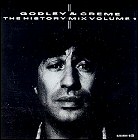 So how do you come up with a best-of album for a musical entity you’ve never heard of? It’s ironic, really, that the one song that 10cc alumni Kevin Godley & Lol Creme are best remembered for…is a new song that was recorded for this 1985 album. And that song’s recognition may in fact spring more from its then-striking B&W video than anything, though “Cry” continually pops up on “best of the 80s” compilations no matter where you go. (In their native Britain, Godley & Creme are much better known for two well-regarded albums, L and Consequences.)
So how do you come up with a best-of album for a musical entity you’ve never heard of? It’s ironic, really, that the one song that 10cc alumni Kevin Godley & Lol Creme are best remembered for…is a new song that was recorded for this 1985 album. And that song’s recognition may in fact spring more from its then-striking B&W video than anything, though “Cry” continually pops up on “best of the 80s” compilations no matter where you go. (In their native Britain, Godley & Creme are much better known for two well-regarded albums, L and Consequences.)
In fact, The History Mix (and to date, for the record, there’s never been a Volume II) does make history – but not for Godley & Creme or their quirky brand of pop. Along with Yes’ 90125, this album is one of the first appearances of the production team of Trevor Horn and J.J. Jeczalik – a duo which was – with the addition of Anne Dudley, Gary Langan and Paul Morley – about to become known as the Art Of Noise at around the same time. The first track on History Mix is actually an Art Of Noise-esque medley of Godley & Creme tunes, with a healthy helping of Godley & Creme-era 10cc numbers thrown in for good measure – “I’m Not In Love”, “Minestrone” and “Rubber Bullets”, with little bits and pieces of a few others. It’s a joyfully raucous remix in which even the smallest snippet of a song is fair game and nothing is sacred – to be quite honest, it’s one of my favorite things Art Of Noise ever did. To say nothing of Godley & Creme. It’s also just about twenty minutes long, so pack a lunch.
Two tracks later, “Expanding The Business” is a similar bit of business, though it lacks the lovingly self-referential oomph of “Wet Rubber Soup”, despite referencing more material. And maybe that points up the simple beauty of “Wet Rubber Soup” – after a few minutes, you finally clue into the fact that you’re hearing chunks and samples of only four or five songs. By upping the number of songs referenced, “Expanding The Business” is a bit too much business, becoming a little confusing.
In between them, however, is that apparently immortal slice of ’80s pop we call “Cry”. It is a really good song, and though it’s loaded down with novelty effects of the time – the guitar is flanged like crazy through the whole song – it stands the test of time and deserves the recognition it’s gotten. Until the end, where, instead of, oh, bringing in someone to do one little guest vocal, the guys pull a Roy Wood and pitch their own voices way up for the ascending scale that closes the song. Maybe it’s just me, but it sounds kinda silly.
But where “Cry” makes the cut and earns a kind of musical immortality, many of the other individual songs on The History Mix fall flat. They rely heavily on just as many sonic stylings of the ’80s, but so much so that they’re actually eminently forgettable. The one exception is “An Englishman In New York” (not the song by the same name that Sting later made famous). It’s a bizarre commentary on American assimilation and commercialization of all those cultures that make up those big melting pot of ours. On one hand, it’s the most gimmicky song on the whole album – well, okay, that’s a bit of a tough call on such a gimmicky album – but somehow it’s the most timeless, and not just because of the subject matter at hand.
 This best-of collection is a bizarre mix, and even if I’m not impressed with all of the new material, I like how a lot of the duo’s older material is intertwined into something that somehow is new. It’s hard to really recommend the whole album on that basis, but some of it’s worth hearing.
This best-of collection is a bizarre mix, and even if I’m not impressed with all of the new material, I like how a lot of the duo’s older material is intertwined into something that somehow is new. It’s hard to really recommend the whole album on that basis, but some of it’s worth hearing.
Oh, and ironically, Lol Creme later joined Art Of Noise. Coincidence?
- Medley: Wet Rubber Soup (18:52)
- Cry (3:55)
- Medley: Expanding The Business / The "Dare You" Man / Humdrum Boys In
Paris / Mountain Tension (17:03)- Light Me Up (4:30)
- An Englishman In New York (5:52)
- Save A Mountain For Me (3:34)
- Golden Boy (5:48)
Released by: Polydor
Release date: 1985
Total running time: 59:43
Ben Folds – Sunny 16
 Ben Folds is back, but you can be forgiven for missing the fanfare, because there hasn’t been much of it – this isn’t a typical major label release. As a warm-up to his next solo album, Folds has been trying out some works-in-progress on listeners through a series of EPs released only into the Japanese market (though you can order them from the links below). Folds has said that there’ll be a trio of these short releases, and some of the songs may appear on his next release on Sony, but some of them won’t – so once again, it’s interesting that we’re essentially listening to someone’s demos. But what demos!
Ben Folds is back, but you can be forgiven for missing the fanfare, because there hasn’t been much of it – this isn’t a typical major label release. As a warm-up to his next solo album, Folds has been trying out some works-in-progress on listeners through a series of EPs released only into the Japanese market (though you can order them from the links below). Folds has said that there’ll be a trio of these short releases, and some of the songs may appear on his next release on Sony, but some of them won’t – so once again, it’s interesting that we’re essentially listening to someone’s demos. But what demos!
We kick off with “There’s Always Someone Cooler Than You”, a song with, if not lead single potential, then just plain single potential at the very least. Lyrically, it’s somewhat related to “Underground” – Folds rails against too much forced, self-conscious cool, and does it with an incredibly catchy tune and some hilarious lyrics (“Yeah, you’re the shit, but you won’t be it for long!”) right up there with “Rockin’ The Suburbs”.
“Learn To Live With What You Are”, “All You Can Eat” and “Rock Star” hit all of the prerequisite stylistic points of Folds’ work, but they’re not all that catchy musically – though “Rock Star”‘s lyrics (“you’ve got to give the people what they want”) just about make up for any perceived musical shortcomings. And in listening to the EP again, I found that “Rock Star” was growing on me pretty fast, though I’d put money on the former two going no further than this EP.
“Songs Of Love” is another example of Folds giving us a waltz, and it’s a good one – for something that’s really meant to be a “does this work?” recording, it’s remarkably finished, with a small string quartet (or a better-than-average imitation of one) giving it some extra  atmosphere. Its place as the last song on the disc is no reflection on its quality – it’s a nice closing ballad in the vein of many such songs that Folds has closed past albums with.
atmosphere. Its place as the last song on the disc is no reflection on its quality – it’s a nice closing ballad in the vein of many such songs that Folds has closed past albums with.
In closing, if Sunny 16‘s stronger tracks are indicative of what’s going to be on Folds’ next full-length release (though there’s no guarantee that any of these songs will appear on that future album, at least not in this form), we’re in for a treat.
- There’s Always Someone Cooler Than You (4:17)
- Learn To Live With What You Are (4:26)
- All You Can Eat (3:24)
- Rock Star (4:25)
- Songs Of Love (4:32)
Released by: Epic
Release date: 2003
Total running time: 22:08
The Animatrix: The Album
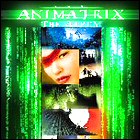 It’s kinda sad, really, that in a careful listen to all of the Matrix franchise soundtracks post-dating the original movie, the biggest revelation turns out to be the quietly-released Animatrix soundtrack. Released along with the DVD in some deluxe packages and released on its own with almost no fanfare, the Animatrix CD contains the music from which the cues used in that collection of nine animated shorts was derived. Now, there’s no doubt that Don Davis is the sound of The Matrix saga for long-form feature films. But I listened to the soundtracks from Animatrix and The Matrix Revolutions back-to-back, and Animatrix is the one that begged for repeat play. In some ways, it’s almost unfair competition: Animatrix had such a wild variety of settings and environments, each crying out for their own unique sounds, that it’d be hard for a movie to keep up. But in that respect, it also resembles the original Matrix more – because wasn’t that movie’s music also a daringly diverse and yet paradoxically cohesive whole?
It’s kinda sad, really, that in a careful listen to all of the Matrix franchise soundtracks post-dating the original movie, the biggest revelation turns out to be the quietly-released Animatrix soundtrack. Released along with the DVD in some deluxe packages and released on its own with almost no fanfare, the Animatrix CD contains the music from which the cues used in that collection of nine animated shorts was derived. Now, there’s no doubt that Don Davis is the sound of The Matrix saga for long-form feature films. But I listened to the soundtracks from Animatrix and The Matrix Revolutions back-to-back, and Animatrix is the one that begged for repeat play. In some ways, it’s almost unfair competition: Animatrix had such a wild variety of settings and environments, each crying out for their own unique sounds, that it’d be hard for a movie to keep up. But in that respect, it also resembles the original Matrix more – because wasn’t that movie’s music also a daringly diverse and yet paradoxically cohesive whole?
A special edit of Peace Orchestra’s pulsating “Who Am I?” leads the disc off appropriately enough (this is the song heard during the DVD’s main menu). Free*Land’s “Big Wednesday” and Layo & Bushwacka’s “Blind Tiger” offer another one-two punch of really good stuff – not overpowering, not too bass-thumpy, but just right. Meat Beat Manifesto’s “Martenot Waves” track is just weird – I just couldn’t get into it for some reason. Almost living up to the Rob Zombie/Marilyn Manson cocktail that closed the original movie is “Ren 2” by Photek, but it just isn’t quite heavy enough, erring on the side of techno instead of metal. “Hands Around My Throat” opens with an alluring smooth groove, and then turns into a rather repetetive techno-rap of sorts – not really my cup of tea, but your mileage may vary.
Things improve with “Beauty Never Fades” by Junkie XL; it’s a good solid song, even though the same group let me down a bit later in the disc. “Supermoves” is a bit predictable – nice stuff, but it sounds almost like a catalogue of clichès that you’d expect to hear from a techno-metal number.
Jumo Reactor – a name no doubt familiar to anyone who’s heard the soundtracks from The Matrix Reloaded and Revolutions – contributes one of the better tracks, “Conga Fury”. The final two cuts, both heavily-remixed Don Davis score tracks from the first two movies featuring copious amounts of film dialogue, aren’t as striking as that seemingly promising combination of elements could have been – if anything, within a couple of minutes, I tend to find them annoying. And that sums the whole CD up, really – the elements are  there for something really cool, but it falls just a little bit short…and yet there’s a fairly compelling energy that binds the whole disc thematically. I’ve got to give at least half the album a recommendation though – there’s something here for just about everyone, but that also means there’s undoubtedly at least one track that’ll rub someone the wrong way in a musical sense too. An interesting listen – and you can take that however you like.
there for something really cool, but it falls just a little bit short…and yet there’s a fairly compelling energy that binds the whole disc thematically. I’ve got to give at least half the album a recommendation though – there’s something here for just about everyone, but that also means there’s undoubtedly at least one track that’ll rub someone the wrong way in a musical sense too. An interesting listen – and you can take that however you like.

- Who Am I? by Peace Orchestra (6:00)
- Big Wednesday by Free*Land (4:52)
- Blind Tiger by Layo & Bushwacka (6:21)
- Under The Gun by Supreme Beings Of Leisure (3:30)
- Martenot Waves by Meat Beat Manifesto (7:43)
- Ren 2 by Photek (4:08)
- Hands Around My Throat by Death In Vegas (5:07)
- Beauty Never Fades by Junkie XL (6:15)
- Supermoves by Overseer (4:48)
- Conga Fury by Juno Reactor (7:26)
- Red Pill, Blue Pill by Junkie XL and Don Davis (9:00)
- The Real by Tech Itch and Don Davis (8:01)
Released by: Maverick / Warner Bros.
Release date: 2003
Total running time: 73:11
Steely Dan – A Decade Of Steely Dan
 Ah, Steely Dan, love ’em or hate ’em. The brainchild of jazzy rockers Walter Becker and Donald Fagen, Steely Dan was an experiment to bring rock and jazz together, an experiment that not everybody welcomed – and yet somehow, the group scored two massive hits with their 1972 debut, the slinky rocker “Do It Again” (whose lyrics allude somewhat nebulously to shady deeds going down) and the more upbeat and yet still lyrically cryptic “Rikki Don’t Lose That Number”. And from there it was uphill in the charts, and downhill in the critics’ reviews, all the way.
Ah, Steely Dan, love ’em or hate ’em. The brainchild of jazzy rockers Walter Becker and Donald Fagen, Steely Dan was an experiment to bring rock and jazz together, an experiment that not everybody welcomed – and yet somehow, the group scored two massive hits with their 1972 debut, the slinky rocker “Do It Again” (whose lyrics allude somewhat nebulously to shady deeds going down) and the more upbeat and yet still lyrically cryptic “Rikki Don’t Lose That Number”. And from there it was uphill in the charts, and downhill in the critics’ reviews, all the way.
Decade strings together Steely Dan’s most recognizable radio hits and a smattering of somewhat more obscure album tracks, all culled from the “band”‘s first ten years. And I put band in quotation marks because it really ceased to be that at some point – Becker and Fagen grew tired of the touring/promotional grind, disbanded the regular core members, and continued with Steely Dan as a studio-only entity. Granted, they had some of the best session players in the fields of rock and jazz by their side, and still scored on the charts, but the touring moratorium cost them more than a few fans.
As with most greatest hits albums, you can hardly critique the songs themselves – they aren’t new – but you can critique what’s included. That said, I’m glad that the theme song from the 1978 movie FM is the lead track on Decade – I’ve always loved the song (but not so much the movie) and didn’t want to bother with the double-disc FM soundtrack, so finally getting “FM” on a proper Steely Dan album is worth the admission charge in and of itself.
“Peg”, “Do It Again” and “Reeling In The Years” are some of my most enduring memories of ’70s radio – I mean, they did get played over and over, didn’t they? Unlike quite a few acts I could name from that era, though, Steely Dan’s output stands up to repeat listening. The bizarre melodic and harmonic twists that their songs throw at the listener are quite unlike anything we’ve heard before or since – even now that Becker and Fagen have forged some kind of truce and are playing (and, bizarrely enough, touring) together again. The new Steely Dan has nothing on the material from this era. It may be an unfair comparison to stack a new album up against a compilation of proven hits, but it’s almost like there are two different bands going by that name – the more recent incarnation having lost some of the nerve required to crash two very different flavors of music  together over 30 years ago.
together over 30 years ago.
This is Steely Dan at its finest. I like their stuff, and I’ve even heard their full albums, but I think it’s safe to say that unless you’re an ardent fan, this album will cover your Steely Dan needs quite nicely. You just won’t need anything else.
- F.M. (4:50)
- Black Friday (3:33)
- Babylon Sisters (5:51)
- Deacon Blues (7:26)
- Bodhisattva (5:16)
- Hey Nineteen (5:06)
- Do It Again (5:56)
- Peg (3:58)
- Rikki, Don’t Lose That Number (4:30)
- Reeling In The Years (4:35)
- East St. Louis Toodle-oo (2:45)
- Kid Charlemagne (4:38)
- My Old School (4:46)
- Bad Sneakers (3:16)
Released by: MCA
Release date: 1985
Total running time: 66:26
8-Bit Weapon – Confidential
 It’s not too often that I’m going to waltz in here and brag about the packaging of a CD, since it’s so frequently tangential to the contents of said CD, but given this disc’s retro-video game theme, it has the coolest possible case: the disc is black on both sides, and comes in a soft-lined floppy disk sleeve cut open at the top. The floppy sleeve comes in the traditional paper envelope, and by God, it looks like a 5 1/4″ floppy.
It’s not too often that I’m going to waltz in here and brag about the packaging of a CD, since it’s so frequently tangential to the contents of said CD, but given this disc’s retro-video game theme, it has the coolest possible case: the disc is black on both sides, and comes in a soft-lined floppy disk sleeve cut open at the top. The floppy sleeve comes in the traditional paper envelope, and by God, it looks like a 5 1/4″ floppy.
Now let’s talk about what happens when you actually play it. The entire CD consists of remixed tunes straight out of a Commodore 64 SID chip. For those who haven’t thought about it in quite a while, the SID chip was the secret behind the C64’s unique musical abilities, and the songs heard here are all from games that made the best use of the SID back in the 80s heyday of that computer. Seth Sternberger adds his own unique touch, usually a somewhat more robust beat than the SID could’ve produced by itself, and the result is as catchy as it is unique. Remixing video game music may not be anything new, to be sure, but this is a case where the artist doing the remixing makes it his own.
 The third and fourth tracks are easily my favorites on here, but it’s all good and highly recommended. As of the time of this review, the 8-Bit Weapon CD is available in a special deal with Sternberger’s solo CD Unfortunate Brain Chemistry. And if you ever get the chance to see him play live at Classic Gaming Expo or some other venue, Seth puts on quite a colorful show.
The third and fourth tracks are easily my favorites on here, but it’s all good and highly recommended. As of the time of this review, the 8-Bit Weapon CD is available in a special deal with Sternberger’s solo CD Unfortunate Brain Chemistry. And if you ever get the chance to see him play live at Classic Gaming Expo or some other venue, Seth puts on quite a colorful show.
- Times of Lore intro (remix) (0:54)
- Neuromancer Ending (Warhol Edit) 2.0 (1:46)
- MULE (Bitblaster mix) (2:20)
- Inspector Gadget (GoGo MIX) (0:58)
- Crazy Comets (Orbital Decay Mix) 2.0 (4:45)
- Chimera (Miles mix) (3:53)
- Spy vs Spy II (Drunk n basement mix) 2.0 (2:55)
- Bards Tale II – Sanctuary Score (Ybarras Mystic mix) (1:45)
- Defender of the Crown Theme (down 4 da Crown mix) (1:01)
- Movie Monsters Game (disco terror mix) (2:08)
- I.G.U.S.T.R.A. (full bit mix) (3:43)
- Commodore C 64 (bit blitz mix) (3:00)
- Boulderdash Theme (Dirty bass mix) (0:47)
- Acidgroove (Orchestral mix) (4:35)
- Agas Sram (Alien Vinyl mix) (3:06)
- Mars Saga (MrJetlands slow jam mix) (2:02)
- Defender of the Crown Romance (on the downlow mix) (1:15)
- Times of Lore Title (Epic Hendrix Mix) (7:49)
Released by: Brainscream
Release date: 2003
Total running time: 48:42
Steve Miller Band – Abracadabra
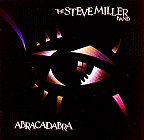 So…what if someone took the traditions of rockabilly and the blues and shoehorned them into a new-wave sound? Wouldn’t that be cool? This seems to have been the train of thought pushing the Steve Miller Band’s Abracadabra down the tracks 20-odd years ago, and for those who picked it up on the basis of the truly cool title track (which, at the time, was a huge single, absolutely inescapable on radio), the bulk of the album may have been a major disappointment. In hindsight, it sure was for me.
So…what if someone took the traditions of rockabilly and the blues and shoehorned them into a new-wave sound? Wouldn’t that be cool? This seems to have been the train of thought pushing the Steve Miller Band’s Abracadabra down the tracks 20-odd years ago, and for those who picked it up on the basis of the truly cool title track (which, at the time, was a huge single, absolutely inescapable on radio), the bulk of the album may have been a major disappointment. In hindsight, it sure was for me.
That title track, though, deserves some praise of its own. “Abracadabra”, the song, is one of those staples of classic-’80s-stations playlists that simply can’t be removed without said station losing all credibility. Its combination of icy ’80s synths and red-hot guitar licks is hard to put away without a repeat listening. Some stations in more conversative areas of the country might have forgone this ’80s treasure due to the “black panties with an angel’s face” line in the lyrics, but for the most part this song got tons of airplay. And it sounded so cool, it earned every repeat it got. For the record, this is the slightly-extended version that didn’t get as much spin as the radio edit did (it’s got a longer solo), so if you know “Abracadabra” only from a best-of-the-’80s compilation, you’re in for a surprise here.
“Cool Magic” runs a distant second for songs with a similarly new sound on this album, but the rest of Abracadabra – the album, not the song – chafes a bit with me, reeking of lost potential. Dropping  some newfangled effects on traditional rockabilly and blues riffs does not a new sound make, and in any case, Dave Edmunds did it better on Information a year later. Still, this is a rare case where I’ll recommend an entire album to you if only on the basis of its one extraordinary single. It’s just too bad that Abracadabra the album wasn’t as beguiling as “Abracadabra” the song.
some newfangled effects on traditional rockabilly and blues riffs does not a new sound make, and in any case, Dave Edmunds did it better on Information a year later. Still, this is a rare case where I’ll recommend an entire album to you if only on the basis of its one extraordinary single. It’s just too bad that Abracadabra the album wasn’t as beguiling as “Abracadabra” the song.
- Keeps Me Wondering Why (3:45)
- Abracadabra (5:08)
- Something Special (3:33)
- Give It Up (3:38)
- Never Say No (3:39)
- Things I Told You (3:20)
- Young Girl’s Heart (3:38)
- Goodbye Love (2:57)
- Cool Magic (4:26)
- While I’m Watching (3:26)
Released by: Capitol
Release date: 1982
Total running time: 37:30
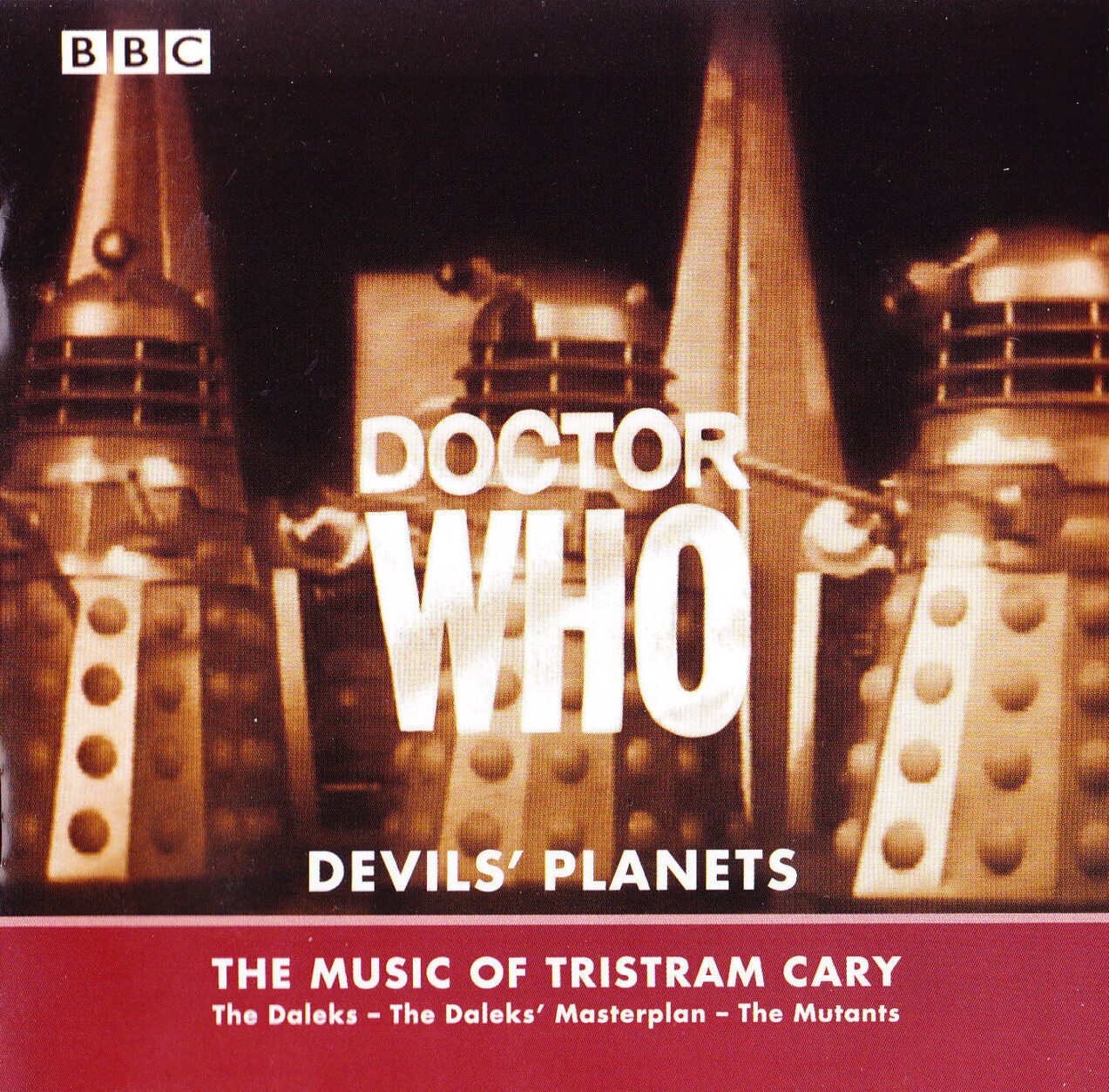
Doctor Who: Devils’ Planets – music by Tristram Cary
Doctor Who wasn’t just groundbreaking science fiction. The classic BBC time travel series was also the source and the inspiration for some groundbreaking music and sound design in its early years. A lot of credit can be given to Delia Derbyshire’s haunting arrangement of Ron Grainer’s theme music, but often less praise is lavished on the incidental music, whose style varied wildly from composer to composer. But five weeks into the series’ existence, more ground was indeed broken by Tristram Cary, one of Britain’s pioneering trailblazers in the then-rarified field of electronic music. With oscillators, early synthesizers and other tools-turned-instruments at his disposal, Cary gave SF soundtrack music a new sound. Years before Kubrick threw heaping helpings of Ligeti musique concrete at us in the soundtrack of 2001, and long after the 50s sci-fi sound of the theremin had passed into clichè, Cary was paving the road that many future Doctor Who composers and even others such as Jerry Goldsmith would follow – the sounds of something truly unearthly.
The three scores featured on this 2-CD set are from 1963’s The Daleks, the mammoth twelve-week epic The Daleks’ Masterplan (which spanned the holiday season of 1965 and ran right through early 1966), and the 1972 Jon Pertwee story The Mutants. Cary also composed the pleasantly western-themed music for the miserably low-rated 1966 story The Gunfighters, which may be included on a later release, but the liner notes point out that the original music tapes of Cary’s score from Marco Polo (1964) are as lost as the video master tapes of the story itself.
The Daleks music is some of Doctor Who’s most distinctive and memorable music, due in no small part to the impact of that original appearance of the titular tin menaces and the fact that it’s one of the only originally-commissioned Doctor Who music scores to be reused for other stories later in the show’s history (though, for the most part, it pops up primarily in later Dalek serials). Track 16 on CD 1 is the sound of the Daleks to me. I first saw this particular story about ten or twelve years ago, but that piece of music has always stuck with me. It’s so sinister and so atonal and so mechanical, it could only be the Daleks. I also have to make mention of the almost feedback-like, ear-rending whine signifying the cliffhanger at the end of episode one – not only is it a defining piece of Doctor Who and TV SF history, it’s a perfect sound for that moment. There’s no way that this is the sound of anything even remotely good happening.
Cary’s music is more traditional for The Daleks’ Masterplan, with a small string ensemble and other more conventional instruments doing most of the legwork, with a few purely electronic interludes for “stings” and other dramatic moments. There are also some cues in this story’s section which are electronically treated – recorded first with traditional acoustic instruments and then given a suitably futuristic twist. Those weaned on the compositions of Dudley Simpson may find this story’s music more to their liking, though as the story wears on and the Doctor’s attempts to halt the Daleks’ disastrous time experiments become more desperate, the music becomes more electronic and less reassuring. And yet there are some lovely moments in there too, including the silent-film-style player piano source music for the comedic Feast Of Steven Christmas episode.
The Mutants represents a jump forward in time and technology, and perhaps the best comparison for this score is the music from its immediate predecessor, The Sea-Devils (whose entire score was previously released on Doctor Who: New Beginnings). Though it could be argued that The Mutants relies on more traditional rhythmic structure than Malcolm Clarke’s challenging Sea-Devils music, in many places it challenges some of the same expectations of tonality. The Mutants is, hands-down, easier to take in one sitting than Sea-Devils, but it’s still going to take a little time to get your head around it.
The excellent remastering job and extensive liner notes were both brought to us by Doctor Who music archivist (and, late in the series’ life span, a composer in his own right) Mark Ayres, while Tristram Cary himself held onto the tapes all these years, and performed some stereo separation on the Mutants tracks on CD 2. Some of the earliest tracks show their age a bit in their sound, but they’re cleaned up admirably and are very sharp and listenable. The whole collection is topped and tailed with the original 1963 version of the Doctor Who theme, and a few tracks of atmospheric sound effects by the Radiophonic Workshop’s Brian Hodgson are included as well: the trademark howling winds of Skaro, the droning boop-BOOP-boop-BOOP-boop-BOOP of the Daleks’ control room, and more. I remember questioning the omission of those two specific sound effects tracks from earlier Doctor Who music-and-FX collections, but this is the perfect place for them: they were worth the wait.
It’s very strange to hear in light of more recent Doctor Who music releases from the 80s, as the latter-day material follows more traditional musical structures, but you owe it to yourself to sit in a dimly-lit room and listen to Tristram Cary’s score from The Daleks at least once, even if you never take the CD out of its case again. This music is as integral to the history of the show as Delia Derbyshire’s arrangement of Ron Grainer’s theme music. Who knows? If the right music hadn’t been paired to the right story, none of us would be remembering Doctor Who in its 40th anniversary year. Many people accustomed to the structure of western music will find the sounds forbiddingly foreign, but seldom has the music for a Doctor Who story been so right. A few fans complained that this wasn’t the 40th anniversary music release they wanted. They wanted  something more obvious, more musical: Logopolis, or The Five Doctors perhaps. But with the 40th anniversary DVD releases weighted heavily toward the 80s, and the Big Finish audio dramas leaning in the same direction, Devils’ Planets is the perfect celebration of where it all started. Listen with an open mind, and do a little traveling back in time of your own.
something more obvious, more musical: Logopolis, or The Five Doctors perhaps. But with the 40th anniversary DVD releases weighted heavily toward the 80s, and the Big Finish audio dramas leaning in the same direction, Devils’ Planets is the perfect celebration of where it all started. Listen with an open mind, and do a little traveling back in time of your own.
Disc One
- Doctor Who (Original Theme) (1:24)
The Daleks (1963-64) Episode 1: The Dead Planet
- Forest Atmosphere (1:08)
- Skaro: Petrified Forest Atmosphere (“Thal Wind”) (1:46)
- Forest with Creature (0:54)
- City Music 1 & 2 (0:56)
- Thing In Jungle (0:52)
- City Music 3 (0:43)
- Dalek City Corridor (0:59)
- The Daleks (0:33)
The Daleks (1963-64) Episode 2: The Survivors
- Radiation Sickness (0:52)
- Dalek Control Room (0:26)
- The Storm (1:27)
The Daleks (1963-64) Episode 3: The Escape
- The Storm Continued: Susan Meets Alydon (2:38)
- Inside The City (0:26)
The Daleks (1963-64) Episode 4: The Ambush
- The Fight (1:02)
- The Ambush (2:00)
- Fluid Link (0:26)
The Daleks (1963-64) Episode 5: The Expedition
- Rising Tension (1:18)
- Demented Dalek (0:22)
- The Swamp (2:31)
The Daleks (1963-64) Episode 6: The Ordeal
- The Cave I (2:07)
- Barbara Loses The Rope (0:17)
- Captives Of The Daleks (0:16)
- Heartbeats (Antodus Falls) (2:17)
The Daleks (1963-64) Episode 7: The Rescue
- The Cave II (2:22)
The Daleks’ Masterplan (1965-66) Episode 1: The Nightmare Begins
- A Strange Sickness (0:44)
- Kembel I (0:47)
- Sting I (0:05)
- Kembel II (0:17)
- Daleks I (0:41)
- Kembel III (0:26)
- Daleks II (1:03)
The Daleks’ Masterplan (1965-66) Episode 2: Day Of Armageddon
- Daleks At The TARDIS (0:25)
- Zephon (1:32)
- Sting II (0:04)
- Pyroflames (0:25)
- Wall Of Fire (0:24)
- At The City Walls (0:37)
- Taranium (0:15)
- Zephon Raises The Alarm (0:40)
The Daleks’ Masterplan (1965-66) Episode 3: Devil’s Planet
- Leaving Kembel (0:21)
- Acceleration (0:54)
- Zephon’s Demise (0:17)
- Desperus (0:46)
- The Screamers (0:20)
The Daleks’ Masterplan (1965-66) Episode 4: The Traitors
- Leaving Desperus (1:25)
- Sting III / Requiem For Katarina (0:53)
- Bret Vyon (0:43)
- Traitor (0:55)
The Daleks’ Masterplan (1965-66) Episode 5: Counter Plot
- Counter Plot (0:15)
- The Experiment (0:41)
- Molecular Dissemination (1:04)
- Limbo (0:51)
- Mira (0:47)
- Invisible Creatures (1:03)
The Daleks’ Masterplan (1965-66) Episode 6: Coronas Of The Sun
- “The Daleks Have Won!” (0:34)
- Invisible Creatures Attack (0:55)
- Taking The Dalek Ship (1:36)
- A New Thread (0:13)
- Fake Taranium (0:25)
- Return To Kembel (0:26)
- Gravity Force (0:26)
The Daleks’ Masterplan (1965-66) Episode 7: The Feast Of Steven
- At The Police Station (0:58)
- At The Movie Studio (3:10)
The Daleks’ Masterplan (1965-66) Episode 8: Volcano
- The Victim I (0:11)
- The Victim II (0:09)
- The Victim III (0:09)
- Lava (1:01)
- The Monk (0:13)
The Daleks’ Masterplan (1965-66) Episode 9: Golden Death
- Ancient Egypt (0:46)
- Dalek Time Machine (0:19)
- The Overseer and the Captain (0:29)
- Daleks At The Pyramids (0:16)
- Daleks Vs. Egyptians (1:02)
- The Doctor Searching (1:05)
- Escape (1:38)
- The Missing TARDIS (0:50)
The Daleks’ Masterplan (1965-66) Episode 10: Escape Switch
- The Tomb (0:55)
- The Mummy (0:28)
- From Egypt To The Ice Planet (0:49)
The Daleks’ Masterplan (!965-66) Episode 11: The Abandoned Planet
- Council In Uproar (1:03)
- The Core (0:17)
- Master Of The Universe (0:57)
Disc Two
The Daleks’ Masterplan (1965-66) Episode 12: Destruction Of Time- The Heart Of The Mountain (0:36)
- Growing Menace (2:08)
- City Music (Loop) (1:43)
- The Time Destructor (5:17)
- The Destruction Of Time (5:18)
- Daleks Disintegrate (1:42)
The Mutants (1972)
- I (0:47)
- II (1:02)
- III (1:00)
- IV (2:31)
- V (1:03)
- VI (1:56)
- VII (1:00)
- VIII (1:46)
- IX (2:41)
- X (0:53)
- XI (1:04)
- XII (2:31)
- XIII (1:35)
- XIV (3:31)
- XV (1:18)
- XVI (0:54)
- XVII (2:25)
- XVIII (1:36)
- XIX (1:05)
- XX (0:52)
- XXI (0:40)
- XXII (1:14)
- XXIII (0:54)
- XXIV (1:35)
- XXV (2:33)
- XXVI (0:46)
- XXVII (2:50)
- XXVIII (0:55)
- XXIX (1:39)
- XXX (1:28)
- XXXI (0:48)
- XXXII (0:51)
- XXXIII (1:09)
- XXXIV (1:44)
- XXXV (1:00)
- XXXVI (1:53)
- XXXVII (1:39)
- XXXVIII (2:04)
- XXXIX (1:58)
- Doctor Who (Closing Theme) (1:15)
Released by: BBC Music
Release date: 2003
Disc one total running time: 72:37
Disc two total running time: 78:02
Jason Falkner – Necessity: The 4-Track Years
 I like Necessity: The 4-Track Years, a collection of lo-fi demo recordings by rising power pop star Jason Falkner, and yet it bugs the heck out of me.
I like Necessity: The 4-Track Years, a collection of lo-fi demo recordings by rising power pop star Jason Falkner, and yet it bugs the heck out of me.
It really says something about Falkner’s fans that they’ll actually buy (A) a CD of home demo recordings, and (B) a CD of songs which, for the most part, they’ve already heard on his two solo albums to date. It’s kind of a treat to hear these songs in their work-in-progress raw state, but the thing about Falkner is that he’s enough of a perfectionist that the difference between demo and finished recording isn’t always that great. “She Goes To Bed”, for example, possibly my favorite Falkner song of all, isn’t all that different here than it is from the final version that made it onto Falkner’s first solo album. Now, I’m impressed that this was mostly done with four-track recorders (a basic piece of home studio gear on which I’ve never managed to sound this good), but Falkner works his arrangements out in his head obsessively – and the result is primarily a difference in the fidelity of the recording.
Such songs as “She Is Not The Enemy” make their first official appearance on record here, though we Falkner fans are notorious for finding the man’s old recordings in bootleg form, so chances are, if you’re into Falkner, there won’t be much new here. “His Train” is just about worth the cost of admission though. I did, however, like the slightly more-chilled-out take on “Hectified”, with its catchy little guitar hook.
Good stuff, but what bugs me is that Necessity is one of several compilations of Jason Falkner’s demos, early indie label singles, B-sides, covers and whatnot that have been released. Some of these have been intended for foreign markets, but most if not all of them overlap heavily in terms of the material used – and this is from an artist whose professional music career as a solo artist spans not quite a decade (less than a  decade as of this compilation’s release), and only two original albums. Falkner’s supposedly been working on a new album for a while, but the number of times he’s recycled old material endlessly in the interim. It’s not as if Jason Falkner owes me a new CD, but after so many demo/B-side/indie label single compilations, part of me is hoping to hear something new from him soon.
decade as of this compilation’s release), and only two original albums. Falkner’s supposedly been working on a new album for a while, but the number of times he’s recycled old material endlessly in the interim. It’s not as if Jason Falkner owes me a new CD, but after so many demo/B-side/indie label single compilations, part of me is hoping to hear something new from him soon.
- She Is Not The Enemy (3:45)
- She Goes To Bed (4:13)
- His Train (3:43)
- Song For Her (2:29)
- I Live (3:09)
- Miracle Medicine (3:24)
- Hard Way (4:46)
- My Home Is Not A House (3:29)
- Take Good Care Of Me (4:25)
- Hectified (2:58)
- Road Kill Rules (4:02)
- I Go Astray (3:54)
Released by: Phantom
Release date: 2001
Total running time: 44:17
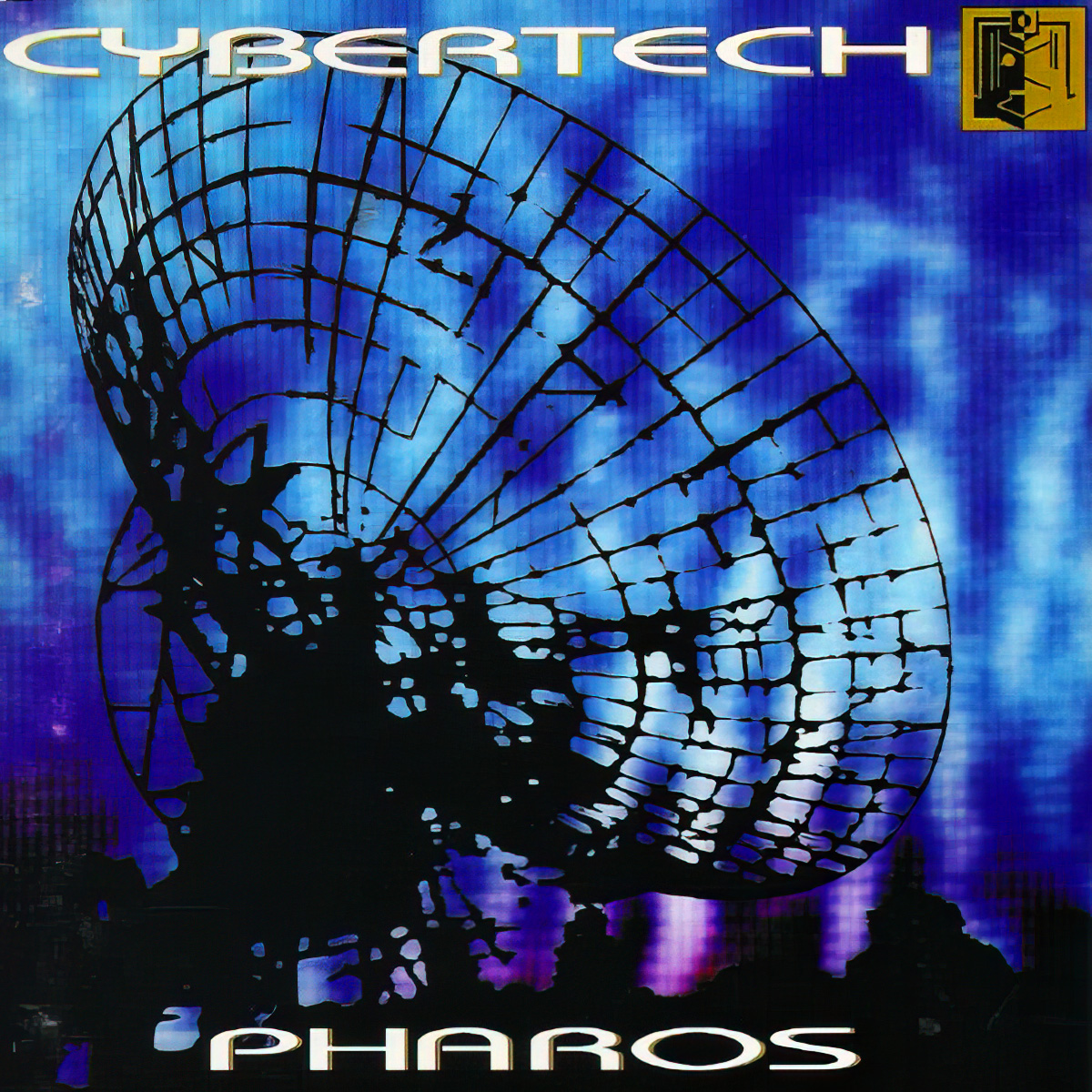
Cybertech Part II: Pharos
An interesting and somewhat obscure release, Pharos is the second collection of musical atmospheres by Cybertech (a.k.a. Michael Fillis and Adrian Pack). The two Cybertech CDs share a common thread: they try to evoke the atmosphere of past eras of Doctor Who music and, at the same time, pay tribute to what was the only source of new Who in the early 90s, Virgin Publishing’s Doctor Who: The New Adventures novels. In a way, Cybertech’s works are rather like the Doctor Who equivalent of the infamous Star Wars soundtrack-to-a-book release Shadows Of The Empire. Pack and Fillis composed original scores for specific scenes of some of the books (with the relevant passages quoted with permission in the CD’s lavishly illustrated booklet), while other adventures are given a score more evocative of a general mood, and some are accompanied by original, non-novel fiction. A few pieces unrelated to any specific book are dotted throughout the disc as well.
Lending the proceedings more of a stamp of Who authenticity are brief cameo appearances by Sylvester McCoy and the late Jon Pertwee, and their respective fellow time travelers Sophie Aldred and Caroline John. McCoy and Aldred’s appearances are “in character” as the Doctor and Ace, even though they each only speak a handful of lines of dialogue in their respective tracks. On the other hand, Jon Pertwee and Caroline John don’t seem to be playing the roles of the third Doctor and Liz Shaw, but instead act as narrators delivering the overall mood in the album’s opening and closing tracks. Mark Gatiss also makes a vocal appearance for the musical theme to his own novel, “Nightshade”.
And the music itself? Pack and Fillis toy around with the Doctor Who sounds of both the 70s and 80s, and nail some of the best approximations of those eras’ moods I’ve heard. Some of the non-story-specific pieces pick up the pace a little bit with more of a dance beat, but nothing terribly incongruous. It’s all very atmospheric,  and right in line with where the music of Doctor Who left off when the series vacated the small screen.
and right in line with where the music of Doctor Who left off when the series vacated the small screen.
So, overall, what do I think of Pharos? I think Big Finish Productions should really be talking to these guys about joining their rotating cast of composing characters. They’re that good.
- Precipice (1:45)
- The Pharos Project (3:12)
- Time’s Crucible (3:15)
- Prometheus Bound (6:45)
- Prometheus Unbound (2:50)
- First Frontier (3:45)
- Yeti (9:15)
- Iceberg (8:00)
- Nightshade TV Theme (4:20)
- Trevithick’s Monsters (5:55)
- Interstitial Time: A Static Vortex (1:20)
- Legacy (3:20)
- Type 40 (3:20)
- Master Mind (10:30)
- Cyberia (4:45)
- Wavelength (2:00)
Released by: Jump Cut Records
Release date: 1995
Total running time: 75:25
Me First and the Gimme Gimmes – Take A Break
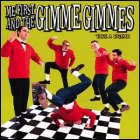 Me First And The Gimme Gimmes don’t release their albums often enough for me. And this is one of their best ones yet. For those who haven’t heard me wax rhapsodic about the Gimmes before, they’re an all-star aggregation of members from other punk bands such as NOFX who gather to deliver a vicious kidney punch to much-deserving radio staples from the 60s, 70s and 80s – and it seems like the latter era is where Take A Break gets its inspiration. The Gimmes once again ride the volume, and their musical skills, up to “11” on the knob, proving that they can actually sing and they can actually play. Something else they can do is be funny as hell, as proven by the masterful touch of adding the Three Stooges’ “hello, hello, hello… hello!” harmony gag to the tail end of Lionel Richie’s ballad “Hello” (a song I used to dread hearing on the radio, though I love this reading of it). Other targets include “Where Do Broken Hearts Go?”, Whitney Houston’s “Save The Best For Last”, and…it’s as if the guys read my mind and plucked out a perfect songlist of tunes with whom I’ve held a grudge for a decade and a half.
Me First And The Gimme Gimmes don’t release their albums often enough for me. And this is one of their best ones yet. For those who haven’t heard me wax rhapsodic about the Gimmes before, they’re an all-star aggregation of members from other punk bands such as NOFX who gather to deliver a vicious kidney punch to much-deserving radio staples from the 60s, 70s and 80s – and it seems like the latter era is where Take A Break gets its inspiration. The Gimmes once again ride the volume, and their musical skills, up to “11” on the knob, proving that they can actually sing and they can actually play. Something else they can do is be funny as hell, as proven by the masterful touch of adding the Three Stooges’ “hello, hello, hello… hello!” harmony gag to the tail end of Lionel Richie’s ballad “Hello” (a song I used to dread hearing on the radio, though I love this reading of it). Other targets include “Where Do Broken Hearts Go?”, Whitney Houston’s “Save The Best For Last”, and…it’s as if the guys read my mind and plucked out a perfect songlist of tunes with whom I’ve held a grudge for a decade and a half.
 So what’s next for the Gimmes? Hopefully an album within the next 12 months, and hopefully an album that drags some of country music’s most hackneyed hits, kicking and screaming, into the Gimmes’ unique punk stylings. Oh, how I can wish for both of those things. If the guys want to tour again in the meantime, however, and play somewhere close enough for me to see the show, I can see letting them have two years instead of just one.
So what’s next for the Gimmes? Hopefully an album within the next 12 months, and hopefully an album that drags some of country music’s most hackneyed hits, kicking and screaming, into the Gimmes’ unique punk stylings. Oh, how I can wish for both of those things. If the guys want to tour again in the meantime, however, and play somewhere close enough for me to see the show, I can see letting them have two years instead of just one.
- Where Do Broken Hearts Go (2:32)
- Hello (2:20)
- End Of The Road (3:02)
- Ain’t No Sunshine (1:46)
- Nothing Compares 2 U (2:41)
- Crazy (3:10)
- Isn’t She Lovely (2:27)
- I Believe I Can Fly (3:03)
- Oh Girl (2:00)
- I’ll Be There (2:09)
- Mona Lisa (2:52)
- Save The Best For Last (2:07)
- Natural Woman (2:37)
Released by: Fat Wreck Chords
Release date: 2003
Total running time: 32:46
Paul Melancon – Camera Obscura
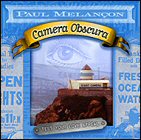 Hailing from Georgia, Paul Melancon is working on carving himself a nice little niche in indie power pop circles. And to listen to Camera Obscura is to discover why he’s earning that respect – Melancon is obviously a student of the Beatles and Brian Wilson, wistful melodies and vocal harmonies, and densely wordy songwriting. The song that drew me to this album is an unabashed valentine to Melancon’s personal pop pedigree, a song in which the singer yearns to “be just like Jeff Lynne.” That proclamation in itself would be enough to get my attention, but this song is easily the high point of the album as it effortlessly appropriates many of the ELO frontman’s trademark licks – call-and-respond backing vocals, stratospheric synth glissandos, a guitar riff that tastes just a little like “Sweet Talkin’ Woman”, and real live strings. If someone was going to pay a musical tribute to Lynne, I can’t think of a better way – and yet the song is playful too, trading on Lynne’s reputation as a studio-bound recluse and hinting that the person singing the song, by trying too hard to be like his hero, is headed for a ruined relationship.
Hailing from Georgia, Paul Melancon is working on carving himself a nice little niche in indie power pop circles. And to listen to Camera Obscura is to discover why he’s earning that respect – Melancon is obviously a student of the Beatles and Brian Wilson, wistful melodies and vocal harmonies, and densely wordy songwriting. The song that drew me to this album is an unabashed valentine to Melancon’s personal pop pedigree, a song in which the singer yearns to “be just like Jeff Lynne.” That proclamation in itself would be enough to get my attention, but this song is easily the high point of the album as it effortlessly appropriates many of the ELO frontman’s trademark licks – call-and-respond backing vocals, stratospheric synth glissandos, a guitar riff that tastes just a little like “Sweet Talkin’ Woman”, and real live strings. If someone was going to pay a musical tribute to Lynne, I can’t think of a better way – and yet the song is playful too, trading on Lynne’s reputation as a studio-bound recluse and hinting that the person singing the song, by trying too hard to be like his hero, is headed for a ruined relationship.
Those aren’t the only bittersweet lyrics, and that’s far from the only good song. “Little Plum” summons up a Beach Boys vibe that begs for a singalong, “Hitchcock Blonde” tells a sordid tale of a bad girl about to get even badder (but with a surprisingly bouncy melody), and “Fine`” may well be the best song on the entire CD, with a slow, stately return to the kind of expansive soft-rock vocal harmony that used to be the mainstay of groups like America. I went through the entire CD and got stuck on this six-minute track, listening to it over and over  again until I started singing along with the background harmonies, having learned the lyrics just from repeat listening. It’s a beautiful thing. Not many songs get me to do that the first time around.
again until I started singing along with the background harmonies, having learned the lyrics just from repeat listening. It’s a beautiful thing. Not many songs get me to do that the first time around.
You can bet that, when Paul Melancon’s next album comes out, I won’t be taking my sweet time to get it. Further proof that many of the real hidden gems of rock ‘n’ roll are, without a doubt, migrating to the indie labels. Camera Obscura is just a stellar album.
- Overture (3:31)
- King Sham (3:21)
- Sherman (4:46)
- Now Wait For Last Year (3:34)
- Entr’acte (3:25)
- Jeff Lynne (4:25)
- Hey, California (4:39)
- Little Plum (4:04)
- Hitchcock Blonde (3:50)
- Finè (6:44)
- You’re So Good To Me (unlisted bonus track – 2:40)
Released by: Daemon Records
Release date: 2002
Total running time: 44:59
The Cardigans – Gran Turismo
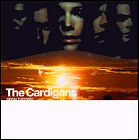 Once upon a time, it seems like I reviewed an earlier, and extremely popular, album by the Cardigans, and was kinda harsh about it. Didn’t mind the music, but I was even less crazy about the lyrics. I’m not here to say “I changed my mind, I take it back,” but I will fess up that the Cardigans have, perhaps, improved.
Once upon a time, it seems like I reviewed an earlier, and extremely popular, album by the Cardigans, and was kinda harsh about it. Didn’t mind the music, but I was even less crazy about the lyrics. I’m not here to say “I changed my mind, I take it back,” but I will fess up that the Cardigans have, perhaps, improved.
Gran Turismo takes the group’s sparse sound into darker territory across the board. This may sound like no big deal, but the effect is amazing – the new sound suits them a whole lot better than the old, and nowhere is this more evident than in Nina Persson’s biting vocals. She still has an angelic, innocent thing going on with her voice, but if ever I got the mental picture of hearing someone sneering while singing, I got it listening to Gran Turismo. More than a few of the lyrics are about screwed-up relationships or surviving them, and there’s a bitter edge to the vocals that simply wasn’t there in earlier material like “Lovefool”. Nor is there anything like “Lovefool”‘s doormat-ish feel – there’s no pleading for someone to “love me, love me, fool me, fool me”; the “character” in some of these song lyrics is not happy about how things have gone. I could see Gran Turismo as a “break-up album.”
Standouts include “New Beginning”, “Hang Around”, the outstanding “Erase/Rewind” (aptly used in the end credits of the  movie The Thirteenth Floor, and the primary reason I decided to give the Cardigans another try), and the hit single of the piece, “My Favourite Game”. Much of the best material comes early on if you listen to it straight through – there’s a definite sense of the album losing steam by the end. But this new direction for the Cardigans suits them completely – it’s a sound they’re more than capable of pulling off, and I hope they stick with it.
movie The Thirteenth Floor, and the primary reason I decided to give the Cardigans another try), and the hit single of the piece, “My Favourite Game”. Much of the best material comes early on if you listen to it straight through – there’s a definite sense of the album losing steam by the end. But this new direction for the Cardigans suits them completely – it’s a sound they’re more than capable of pulling off, and I hope they stick with it.
- Paralyzed (4:59)
- Erase / Rewind (3:40)
- Explode (4:06)
- Starter (3:55)
- Hanging Around (3:45)
- Higher (4:34)
- Marvel Hill (4:16)
- My Favourite Game (3:40)
- Do You Believe (3:21)
- Junk Of The Hearts (4:10)
- Nil (2:15)
Released by: Polygram
Release date: 1998
Total running time: 42:41
R.E.M. – In Time: The Best Of R.E.M. 1988-2003
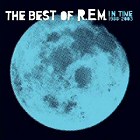 I first heard of R.E.M. when I heard “Stand” on the car radio during a snow day in eighth grade. When Out Of Time rolled around during my sophomore year in high school, the band became my favorite, and it hasn’t relinquished the title since. Many of their songs serve as the anchor points through which I can recall my life and how I lived it when I originally heard them. It’s no coincidence that this Best Of collection that covers the group’s time with Warner Bros. also parallels my awareness of their music – without the major-label push that got “Stand” and “Losing My Religion” on Top 40 radio, there’s no way this music would ever have reached my sheltered ears. I can only thank the heavens that it did.
I first heard of R.E.M. when I heard “Stand” on the car radio during a snow day in eighth grade. When Out Of Time rolled around during my sophomore year in high school, the band became my favorite, and it hasn’t relinquished the title since. Many of their songs serve as the anchor points through which I can recall my life and how I lived it when I originally heard them. It’s no coincidence that this Best Of collection that covers the group’s time with Warner Bros. also parallels my awareness of their music – without the major-label push that got “Stand” and “Losing My Religion” on Top 40 radio, there’s no way this music would ever have reached my sheltered ears. I can only thank the heavens that it did.
This collection is not quite a greatest hits package, since “Shiny Happy People” isn’t included and few, if any, of the included post-Monster songs qualify as hits. It’s not quite a greatest-songs collection, either, since it limits itself to singles, a couple of soundtrack cuts, and two new songs. It is a solid, although not perfect, retrospective of the band’s last fifteen years.
The album many consider to be the band’s best, Automatic For The People, gets the lion’s share, with four out of the eighteen tracks. “Man On The Moon” and “Everybody Hurts” are included, of course, as are “The Sidewinder Sleeps Tonight” and “Nightswimming”. The last of those is a bit of a surprise to me, since even in the summer of R.E.M. that song didn’t seem to get much airplay. But I’m grateful it’s there, since “Nightswimming” is probably my favorite song. Mike Mills’s piano is beautiful, the string arrangements are terrific, and Michael Stipe’s lyrics and delivery so perfectly capture a feeling of longing for the past that as soon as I heard it I just knew I’d knew I’d be listening to it a decade later.
Out Of Time, the band’s breakthrough, is represented only by the obvious “Losing My Religion”. I would have loved to see “Radio Song” on this disc, but I guess the band figured if “Shiny Happy People” wasn’t going to be there, nothing else from Out Of Time would. I can understand the sentiment, and “Shiny Happy People” was never one of my favorites. But the result is that a very important album feels under-represented. The only other album that doesn’t contribute two songs to the disc is Monster, which adds “What’s The Frequency, Kenneth?” Since Monster, despite its popularity at the time, is considered by many to be something of the odd bird in the R.E.M. discography, I can certainly see the sense of that decision.
I think that New Adventures In Hi-Fi, the last album Bill Berry contributed to, is on a par with Automatic, but many of its stronger songs never caught on as singles. While “E-Bow The Letter” has grown on me in the years since, I still think it was poorly chosen as the album’s first single, and may have contributed to the album’s somewhat-disappointing performance. “Electrolite” is another track with a solid Mills piano line, more fun and up-tempo than “Nightswimming” but still a fine song.
The post-Berry selections are rather interesting. Up and Reveal both contribute two singles, and they’re good songs that nonetheless reflect the band trying to find its way as a trio. My favorite song on the disc from this era is “The Great Beyond”, the single from the soundtrack to Man On The Moon. It combines the electronica-tinged moodiness of Up and Reveal with a solid song structure and energetic lyrics from Stipe. The band also reaches into the past for “All The Right Friends” (from the Vanilla Sky soundtrack) and the current single “Bad Day”, older songs that the band completed and re-recorded in the last few years. They certainly have a more ‘traditional’ R.E.M. sound, and I enjoy listening to them. Part of me wonders if the mining of the past isn’t part of the post-Berry learning process, as Mills, Stipe and Peter Buck reclaim and reinterpret some of their older material. The other new song, “Animal”, is fairly forgettable, but doesn’t detract from the collection.
In Time is also available as a 2-disc special edition. In addition to a liner notes booklet written by Buck, the second disc contains demos, live performances, and additional soundtrack cuts, such as “Fretless” from Until the End of the World, “It’s a Free World Baby” from Coneheads and Friends, and an alternate version of “Leave” from  A Life Less Ordinary that I personally don’t think holds a candle to the original from New Adventures. The acoustic version of “The One I Love” is damned good, however. As for William S. Burroughs delivering a spoken-word rendition of “Star Me Kitten”…that one, you gotta hear to believe. I highly recommend both versions.
A Life Less Ordinary that I personally don’t think holds a candle to the original from New Adventures. The acoustic version of “The One I Love” is damned good, however. As for William S. Burroughs delivering a spoken-word rendition of “Star Me Kitten”…that one, you gotta hear to believe. I highly recommend both versions.
Disc one
- Man on the Moon (5:14)
- The Great Beyond (5:07)
- Bad Day (4:07)
- What’s the Frequency, Kenneth? (4:01)
- All the Way to Reno (4:45)
- Losing My Religion (4:29)
- E-Bow the Letter (5:26)
- Orange Crush (3:52)
- Imitation of Life (3:58)
- Daysleeper (3:40)
- Animal (4:02)
- The Sidewinder Sleeps Tonite (4:08)
- Stand (3:12)
- Electrolite (4:07)
- All the Right Friends (2:48)
- Everybody Hurts (5:18)
- At My Most Beautiful (3:36)
- Nightswimming (4:18)
Disc two (special edition only)
- Pop Song 89 (Acoustic) (2:58)
- Turn You Inside-Out (Live) (4:18)
- Fretless (4:51)
- Chance (Dub) (2:34)
- It’s a Free World Baby (5:13)
- Drive (Live) (3:31)
- Star Me Kitten (Featuring William S. Burroughs) (3:31)
- Revolution (3:05)
- Leave (Alternate Version) (4:43)
- Why Not Smile (Alternate Version) (3:02)
- The Lifting (Demo) (5:21)
- Beat a Drum (Demo) (4:28)
- 2JN (3:27)
- The One I Love (Live) (3:25)
- Country Feedback (Live) (6:16)
Released by: Warner Bros.
Release date: 2003
Disc one total running time: 76:17
Disc one total running time: 61:22 (special edition only)
Julee Cruise – The Art Of Being A Girl
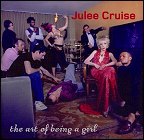 It’s been a long time since we heard anything out of Julee Cruise – too long. More like a decade, really. Okay, she’s done a few guest appearances, some soundtrack one-offs, and stuff like that, but ten years is a long time between solo projects – long enough for everyone except the most ardent fans to forget. Fortunately, Julee’s got plenty of those – her big exposure came along with a little show called Twin Peaks, something which it seems had nothing but ardent fans.
It’s been a long time since we heard anything out of Julee Cruise – too long. More like a decade, really. Okay, she’s done a few guest appearances, some soundtrack one-offs, and stuff like that, but ten years is a long time between solo projects – long enough for everyone except the most ardent fans to forget. Fortunately, Julee’s got plenty of those – her big exposure came along with a little show called Twin Peaks, something which it seems had nothing but ardent fans.
The Art Of Being A Girl owes less to the ethereal, dreamy style of Twin Peaks or her two previous solo albums than it does to that more recent work. Moby, Hybrid and numerous other acts have engaged Julee’s vocal services in recent years, and she’s become something of a known quantity in techno and especially lounge music circles. It’s that genre that she’s exploring in Art, and that genre from which she draws guests and producers of her own.
To be fair, it’s not the total culture shock that longtime Julee fans might expect. Despite being a bit funky, Art evokes the same smoky feel as Floating Into The Night, but in a slightly more modern sonic setting. It’s not as different as you might think. Truthfully, her Scream soundtrack selection (“If I Survive”) with Hybrid was more of a jarring change than this is.
And yet, there are some major shifts – the little monologues between songs are new (her ruminations on a superficial party crowd leading up to the opening strains of “You’re Staring At Me” are hilarious), and the kind of torchy jazz that made her a hit with Twin Peaks fans is now filtered through some decidedly modern influences – as the label on the shrinkwrap puts it, this CD falls into the categories of “lounge,” “chill-out” and “downtempo” all at the same time (quite a feat). Some of the new directions explored here include almost Siouxsie-ish vocals on “Falling In Love” amd “Three Jack Swing”, and giving any modern R&B diva you care to name a run for their money with the silky “The Fire In Me” (which, unannounced on the track list, also features a modernized take on “Falling”, Julee’s Twin Peaks theme song). At the heart of  many of the songs, though, it’s still the sparing, alluring sound that dates back to her earlier works.
many of the songs, though, it’s still the sparing, alluring sound that dates back to her earlier works.
I highly recommend this one to Julee’s old fans, and to the listeners who may not have dug her earlier works – she might just reel you in with this one.
- You’re Staring At Me (3:42)
- The Orbiting Beatnik (4:28)
- Falling In Love… (5:56)
- The Art Of Being A Girl (4:57)
- Everybody Knows (3:11)
- 9th Ave. Limbo (5:05)
- Slow Hot Wind (3:57)
- Cha Cha In The Dark (4:15)
- Shine (4:16)
- Beachcomber Voodoo (4:49)
- Three Jack Swing (3:53)
- The Fire In Me + bonus track Falling (15:27)
Released by: Water Music
Release date: 2003
Total running time: 63:56
Chicago – Greatest Hits, 1982-1989
 I’ve always been a casual fan of Chicago. When you’re growing up and both your mom and your older brother are taking turns cranking up the original Chicago Transit Authority double LP at every opportunity, you learn to like it, or you go nuts.
I’ve always been a casual fan of Chicago. When you’re growing up and both your mom and your older brother are taking turns cranking up the original Chicago Transit Authority double LP at every opportunity, you learn to like it, or you go nuts.
Okay, maybe I should ditch that intro before the inevitable smart-arse comments come rolling in. In any case, I’ve always been a fan of Chicago, but a fan of old Chicago – before Chicago suffered the same fate as Genesis in the 1980s, that of becoming not much more than a mere backing band for a lead vocalist more concerned with his solo career. The only 80s Chicago I ever owned was a cassette copy of Chicago 16, and that was just because I liked “Niagara Falls”. I felt like a lot of the stuff Chicago was turning out in the early to mid 80s was limp compared to their glorious past.
Then I got this CD dirt cheap, and was reminded – upon hearing “Look Away” – that sometimes I can be a bit harshly judgemental. The truth is, I didn’t know when I was well off with “Hard To Say I’m Sorry / Get Away” and the other early 80s stuff before Chicago suffered yet another paradigm shift into “power ballad” territory.
There are a couple of gems on this Greatest Hits disc spanning Chicago’s dismal chain of radio-friendly hits of the 80s, and sadly “Niagara Falls” isn’t among them. If the strains of “Hard Habit To Break”, “I Don’t Wanna Live Without Your Love” and the post-Peter Cetera “What Kind Of Man Would I Be?” sound vaguely similar, it’s no coincidence: by that time in Chicago’s career, a sameness had set in where songwriting, performance and production were concerned. Gone were any traces of what Chicago once was.
 At least in punchier, well-arranged numbers like “Love Me Tomorrow”, “Stay The Night”, and “If She Would Have Been Faithful…”, as sappy and sugary as they may be, there’s at least some vestige of real Chicago in there. Bits of this collection are okay as stand-alone songs, but don’t listen to it right after the pre-80s Chicago hits compilations – the contrast will drive you nuts.
At least in punchier, well-arranged numbers like “Love Me Tomorrow”, “Stay The Night”, and “If She Would Have Been Faithful…”, as sappy and sugary as they may be, there’s at least some vestige of real Chicago in there. Bits of this collection are okay as stand-alone songs, but don’t listen to it right after the pre-80s Chicago hits compilations – the contrast will drive you nuts.
- Hard To Say I’m Sorry / Get Away (5:08)
- Look Away (4:03)
- Stay The Night (3:49)
- Will You Still Love Me? (5:43)
- Love Me Tomorrow (5:01)
- What Kind Of Man Would I Be (4:14)
- You’re The Inspiration (3:50)
- I Don’t Wanna Live Without Your Love (3:53)
- Hard Habit To Break (4:44)
- Along Comes A Woman (4:16)
- If She Would Have Been Faithful… (3:53)
- We Can Last Forever (3:44)
Released by: Reprise
Release date: 1989
Total running time: 52:18
Jewel – 0304
 Y’know, when she started out in the mid-1990s, I used to defend Jewel against the popular “Hippie Spice” insult that was often hurled her way, as I really liked that first album of hers, and even liked the second. A couple of years ago, I was a bit more ambivalent about her third album. And now?
Y’know, when she started out in the mid-1990s, I used to defend Jewel against the popular “Hippie Spice” insult that was often hurled her way, as I really liked that first album of hers, and even liked the second. A couple of years ago, I was a bit more ambivalent about her third album. And now?
Well…uh…I still really like her first album. 0304, on the other hand, spins her off in a completely different direction into a different style of music, and I’m not really sure it suits her …but hey, it’s her career. 0304 opens with “Stand”, sort of a middle-ground between her old, faux-folky lyrical style and her new musical style, as if this is supposed to ease us into the transition. (Hint: it does not.) What follows is basically an album of club rhythms over which Jewel sings some decidedly light-headed lyrics (i.e. “you plus me equals l-o-v-e”), abandoning her previous style of thoughtful and heartfelt lyrics (even if they weren’t necessarily comprehensible in a literal sense). Now she’s singing about a club where the music’s pumpin’ and the bodies are jumpin’…oooookay.
Not all of the songs grate on my nerves – “Run 2 U” reminded me rather pleasantly of the Moody Blues’ drum-machine-driven “English Summer” – but what really bugs me with 0304 is not the change in style, but the radical change in personality. According to all of the press material surrounding this album, Jewel came to her club music epiphany of her own free will, but something about 0304 fairly reeks of corporate interference. “Jewel wants to do another album? Well, that’s great, but can she go from mild acoustic/electric folk-rock to some sexy club music instead? That’d be great. And let’s get to sing through the exact same effects filter as Britney Spears, I love that sound! Great. Let’s do lunch sometime.” (And no, I’m not kidding about the filtered vocals – note to producer: if I wanted to listen to Britney Spears, I’d listen to bleedin’ Britney Spears.)
 I have no problem with artists reinventing themselves – hell, Madonna started working with William Orbit and came up with my favorite stuff from her in years – but something’s rotten in the state of Denmark here. I really hope Jewel’s “club music epiphany” is short-lived. Not that I don’t like that style of music, but there are people out there doing it so much better than she is.
I have no problem with artists reinventing themselves – hell, Madonna started working with William Orbit and came up with my favorite stuff from her in years – but something’s rotten in the state of Denmark here. I really hope Jewel’s “club music epiphany” is short-lived. Not that I don’t like that style of music, but there are people out there doing it so much better than she is.
- Stand (3:15)
- Run 2 U (3:39)
- Intuition (3:54)
- Leave The Lights On (3:23)
- 2 Find U (3:16)
- Fragile Heart (3:33)
- Doin’ Fine (3:14)
- 2 Become 1 (4:40)
- Haunted (4:53)
- Sweet Temptation (4:09)
- Yes U Can (4:01)
- U & Me = LOVE (3:37)
- America (3:43)
- Becoming (4:22)
Released by: Atlantic
Release date: 2003
Total running time: 53:39
Fleetwood Mac – Say You Will
 Fleetwood Mac is back in the studio – it must be the end times after all! Sadly, they’re back in the studio as a quartet, minus the divinely classy Christine McVie, and it’s just not the same.
Fleetwood Mac is back in the studio – it must be the end times after all! Sadly, they’re back in the studio as a quartet, minus the divinely classy Christine McVie, and it’s just not the same.
One of my biggest frustrations with Say You Will concerns a saddening realization about my favorite musician in the whole band. Well, maybe realization isn’t the word for it – to a certain extent, now that I look back at it, I was complaining about some lack of originality with Lindsey Buckingham’s last solo effort, and sadly, that’s also my chief complaint here. His guitar work is so similar from song to song that it’s unnerving to listen to the whole album in one sitting. I shouldn’t be liking the Stevie Nicks tunes better than Buckingham’s, as I quite honestly tend to skip her entries in the Fleetwood Mac catalogue. But Buckingham seems to be writing the same few songs over and over here, I look forward to Nicks’ tunes as a breath of fresh air on Say You Will. The guitar-heavy album also makes me realize that perhaps Fleetwood Mac lost more when Christine McVie left than they did when Buckingham left previously. It really hits me here how much her voice, her keyboards and songwriting style balanced things out. Parts of Say You Will come across as an uninspired, unfinished Buckingham solo effort in a lot of places.
Highlights include the Buckingham/Nicks two-hander “Peacekeeper” (already getting a bit too much saturation exposure on radio), Nicks’ “Illume” (which bears the simple subtitle of “9/11”), and Buckingham’s  best track this time around, “Miranda”. “Silver Girl”, “Thrown Down” and the title track are also worth a listen.
best track this time around, “Miranda”. “Silver Girl”, “Thrown Down” and the title track are also worth a listen.
An interesting conceit, this Fleetwood Mac reunion in the studio, but sadly I’m just not sure it worked. I’ll admit that it’s grown on me since the first listen, and it may continue to do so, but almost a month of listening to it hasn’t quite sold me on the merits.
- What’s The World Coming To (4:07)
- Murrow Turning Over In His Grave (4:13)
- Illume (9/11) (4:14)
- Thrown Down (4:29)
- Miranda (4:17)
- Red Rover (3:25)
- Say You Will (3:57)
- Peacekeeper (5:02)
- Come (5:28)
- Smile At You (3:13)
- Running Through The Garden (3:53)
- Silver Girl (3:21)
- Steal Your Heart Away (3:53)
- Bleed To Love Her (3:57)
- Everybody Finds Out (3:53)
- Destiny Rules (3:53)
- Say Goodbye (3:28)
- Goodbye Baby (3:50)
Released by: Warner Bros.
Release date: 2003
Total running time: 62:11
The Matrix Revolutions – music by Don Davis
 Hmmmmm.
Hmmmmm.
I don’t even know if I’ve got room to talk about this one. When the first reports rolled in that The Matrix Revolutions soundtrack release was going to consist almost entirely of Don Davis’ score for the third and final Matrix movie, I was really happy – I enjoyed the second disc of the soundtrack from The Matrix Reloaded tremendously, much more than I did the techno-metal brew of the first disc. So surely it goes to follow that I’d be eating this CD up, right?
Hmmmmmm.
Again, this is a case where I have yet to see the movie, so I have no visual context for the music here. (For those of you wondering about why I keep doing things in that order, just consider – anymore, the cost of a movie ticket has almost caught up with the cost of a CD, and I get to keep the CD.) But listened to all in one sitting, a lot of The Matrix Revolutions soundtrack sounds…well…all alike. Now, I remember in 1999, everyone was going on about how Don Davis had ushered truly modern neoclassicicsm into the movie theater. And that’s a good point – the first movie’s music, and a good chunk of the second film’s music, had a similar, unified sound. But it wasn’t dull. And as much as I hate to say it…as a purely musical experience, dull is how I’d describe The Matrix Revolutions. One wonders if Don Davis shouldn’t have escorted truly modern neoclassicism right back out of the movie theater a bit sooner – it’s just possible that by the third 2+ hour film in the series, that choice had him in a creative straitjacket.
And he almost does break that mold in places – there are two or three instances in The Matrix Revolutions where I could swear Davis was building up to…Ben Kenobi’s theme! A coincidence, I’m sure, but one that made me chuckle. Even the collaborations with Juno Reactor, the techno group who helped Davis kick prodigious quantities of ass with such Matrix Reloaded tracks as “Burly Brawl”, fall short of the second movie, let alone the first.
And yet there are tracks that make me hungry to see the movie and find out what’s going on – “Spirit Of The Universe”‘s triumphant ending being one of those. Perhaps within the context of the accompanying visuals, all of this would have more meaning to me, but listening to it cold without that context, The Matrix Revolutions is a bit of a surprising disappointment. I had already detected a bit of  sameness guiding Don Davis’ music for the trilogy, but it didn’t actually bore me – if you can imagine rapid-fire runs of trumpet blasts screaming desperation in minor keys boring someone – until now. Maybe this wasn’t a good time to ditch the half-song, half-score rule of thumb for the previous Matrix soundtracks.
sameness guiding Don Davis’ music for the trilogy, but it didn’t actually bore me – if you can imagine rapid-fire runs of trumpet blasts screaming desperation in minor keys boring someone – until now. Maybe this wasn’t a good time to ditch the half-song, half-score rule of thumb for the previous Matrix soundtracks.
- The Matrix Revolutions Main Title (1:23)
- The Trainman Cometh with Juno Reactor (2:45)
- Tetsujin with Juno Reactor (3:23)
- In My Head performed by Pale 3 (3:48)
- The Road To Sourceville (1:27)
- Men In Metal (2:20)
- Niobe’s Run (2:50)
- Woman Can Drive (2:43)
- Moribund Mifune (3:49)
- Kidfried (4:51)
- Saw Bitch Workhorse (4:01)
- Trinity Definitely (4:17)
- Neodammerung (6:01)
- Why, Mr. Anderson? (6:12)
- Spirit Of The Universe (4:53)
- Navras with Juno Reactor (9:08)
Released by: Warner / Maverick
Release date: 2003
Total running time: 63:51

